Bass Sheet Music
 "Albert King wasn't my brother in blood, but he sure was my brother in Blues" B.B. King
"Albert King wasn't my brother in blood, but he sure was my brother in Blues" B.B. King
Beatles

The Beatles were an English rock band formed in Liverpool in 1960. Their best-known lineup, consisting of John Lennon, Paul McCartney, George Harrison, and Ringo Starr, became the greatest and most influential act of the rock era, introducing more innovations into popular music than any other rock band of the 20th century. Rooted in skiffle and 1950s rock and roll, the Beatles later utilized several genres, ranging from pop ballads to psychedelic rock, often incorporating classical elements in innovative ways. In the early 1960s, their enormous popularity first emerged as "Beatlemania", but as their songwriting grew in sophistication, they came to be perceived by many fans and cultural observers as an embodiment of the ideals shared by the era's sociocultural revolutions.
The band built their reputation playing clubs in Liverpool and Hamburg over a three-year period from 1960. Manager Brian Epstein moulded them into a professional act and producer George Martin enhanced their musical potential. They gained popularity in the United Kingdom after their first modest hit, "Love Me Do", in late 1962. They acquired the nickname the "Fab Four" as Beatlemania grew in Britain over the following year, and by early 1964 they had become international stars, leading the "British Invasion" of the United States pop market. From 1965 on, the Beatles produced what many critics consider their finest material, including the innovative and widely influential albums Rubber Soul (1965), Revolver (1966), Sgt Pepper's Lonely Hearts Club Band (1967), The Beatles (1968), and Abbey Road (1969). After their break-up in 1970, they each enjoyed successful musical careers. Lennon was shot and killed in December 1980, and Harrison died of lung cancer in November 2001. McCartney and Starr remain musically active.
The band built their reputation playing clubs in Liverpool and Hamburg over a three-year period from 1960. Manager Brian Epstein moulded them into a professional act and producer George Martin enhanced their musical potential. They gained popularity in the United Kingdom after their first modest hit, "Love Me Do", in late 1962. They acquired the nickname the "Fab Four" as Beatlemania grew in Britain over the following year, and by early 1964 they had become international stars, leading the "British Invasion" of the United States pop market. From 1965 on, the Beatles produced what many critics consider their finest material, including the innovative and widely influential albums Rubber Soul (1965), Revolver (1966), Sgt Pepper's Lonely Hearts Club Band (1967), The Beatles (1968), and Abbey Road (1969). After their break-up in 1970, they each enjoyed successful musical careers. Lennon was shot and killed in December 1980, and Harrison died of lung cancer in November 2001. McCartney and Starr remain musically active.
Maurizio Rolli
Maurizio Rolli is an upright and electric bass player and teacher, big band arranger and composer. His new record “Rolli's tones” (Widesound) features freshly rearranged hard rock classics, arranged for the Rolli's Tones Big Band, with guests Peter Erskine, Mike Stern, Hiram Bullock, Bob Sheppard and Bob Franceschini.
Chick Corea

Armando Anthony "Chick" Corea (born June 12, 1941) is a multiple Grammy Award-winning American jazz pianist, keyboardist, drummer, and composer.
He is known for his work during the 1970s in the genre of jazz fusion. He participated in the birth of the electric fusion movement as a member of Miles Davis' band in the 1960s, and in the 1970s formed Return to Forever.
He continued to pursue other collaborations and explore various musical styles throughout the 1980s and 1990s. He is also known for promoting Scientology.
He is known for his work during the 1970s in the genre of jazz fusion. He participated in the birth of the electric fusion movement as a member of Miles Davis' band in the 1960s, and in the 1970s formed Return to Forever.
He continued to pursue other collaborations and explore various musical styles throughout the 1980s and 1990s. He is also known for promoting Scientology.
Indochine
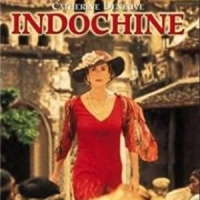
Indochine (French pronunciation: ) is a 1992 French period drama film set in colonial French Indochina during the 1930s to 1950s. It is the story of Éliane Devries, a French plantation owner, and of her adopted Vietnamese daughter, Camille, with the rising Vietnamese nationalist movement set as a backdrop. The screenplay was written by novelist Érik Orsenna, scriptwriters Louis Gardel, Catherine Cohen, and Régis Wargnier, who also directed the film. The film stars Catherine Deneuve, Vincent Pérez, Linh Dan Pham, Jean Yanne and Dominique Blanc. The film won the Academy Award for Best Foreign Language Film at the 65th Academy Awards.
Hillsong United

The Hillsong United band is an Australian rock and worship band, a part of Hillsong Church's youth ministry Hillsong United. Their music is a contemporary style of praise and worship tempered with mainstream rock.
Current members of the Hillsong United band include Jonathon Douglass (J.D.), Jadwin "Jad" Gillies, Holly Watson, Annie Garratt, Bec Gillies, and Michelle Fragar, daughter of Russell Fragar. Michael Guy Chislett plays guitar and Matthew Tennikoff plays bass guitar. Former original drummer Luke Munns made a transition from the drums to front the rock/indie band LUKAS. Popular New Zealand artist Brooke Fraser recently joined the band when she joined the church, first appearing on United We Stand.
The annual Hillsong United CD/DVD was recorded over many years during their October youth conference Encounterfest, with the album released in the first quarter of the following year. The 2007 album All of the Above was the first album to be fully studio recorded, containing videos of songs on the DVD. The band has toured in a number of countries, leading worship to thousands in North and South America, Europe and Asia.
Current members of the Hillsong United band include Jonathon Douglass (J.D.), Jadwin "Jad" Gillies, Holly Watson, Annie Garratt, Bec Gillies, and Michelle Fragar, daughter of Russell Fragar. Michael Guy Chislett plays guitar and Matthew Tennikoff plays bass guitar. Former original drummer Luke Munns made a transition from the drums to front the rock/indie band LUKAS. Popular New Zealand artist Brooke Fraser recently joined the band when she joined the church, first appearing on United We Stand.
The annual Hillsong United CD/DVD was recorded over many years during their October youth conference Encounterfest, with the album released in the first quarter of the following year. The 2007 album All of the Above was the first album to be fully studio recorded, containing videos of songs on the DVD. The band has toured in a number of countries, leading worship to thousands in North and South America, Europe and Asia.
Pink Floyd
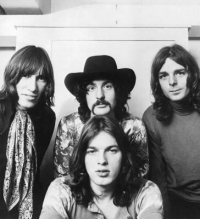
Pink Floyd are an English rock band from Cambridge. The band initially earned recognition for their psychedelic and space rock music, and, as they evolved, for their progressive rock music. Pink Floyd are known for philosophical lyrics, sonic experimentation, innovative album cover art, and elaborate live shows. One of rock music's most successful acts, the group have sold over 200 million albums worldwide including 74.5 million albums in the United States alone. Pink Floyd have influenced progressive rock artists of the 1970s such as Genesis and Yes; and contemporary artists such as Nine Inch Nails and Dream Theater.
Pink Floyd had moderate mainstream success and were one of the most popular bands in the London underground music scene in the late 1960s as a psychedelic band led by Syd Barrett. However, Barrett's erratic behaviour eventually forced his colleagues to replace him with guitarist and singer David Gilmour. After Barrett's departure, singer and bass player Roger Waters gradually became the dominant and driving force in the group by the late-1970s, until his eventual departure from the group in 1985. The band recorded several albums, achieving worldwide success with The Dark Side of the Moon (1973), Wish You Were Here (1975), Animals (1977), and The Wall (1979).
In 1985, Waters declared Pink Floyd "a spent force", but the remaining members, led by Gilmour, continued recording and touring under the name Pink Floyd. Waters sued them for the name and eventually they reached a settlement out of court, under which Gilmour, Mason and Wright would continue as Pink Floyd. They again enjoyed worldwide success with A Momentary Lapse of Reason (1987) and The Division Bell (1994). Waters performed with the band for the first time in 24 years on 2 July 2005 at the London Live 8 concert.
Pink Floyd had moderate mainstream success and were one of the most popular bands in the London underground music scene in the late 1960s as a psychedelic band led by Syd Barrett. However, Barrett's erratic behaviour eventually forced his colleagues to replace him with guitarist and singer David Gilmour. After Barrett's departure, singer and bass player Roger Waters gradually became the dominant and driving force in the group by the late-1970s, until his eventual departure from the group in 1985. The band recorded several albums, achieving worldwide success with The Dark Side of the Moon (1973), Wish You Were Here (1975), Animals (1977), and The Wall (1979).
In 1985, Waters declared Pink Floyd "a spent force", but the remaining members, led by Gilmour, continued recording and touring under the name Pink Floyd. Waters sued them for the name and eventually they reached a settlement out of court, under which Gilmour, Mason and Wright would continue as Pink Floyd. They again enjoyed worldwide success with A Momentary Lapse of Reason (1987) and The Division Bell (1994). Waters performed with the band for the first time in 24 years on 2 July 2005 at the London Live 8 concert.
John Scofield
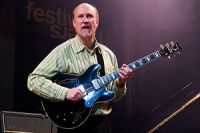
John Scofield (born December 26, 1951), sometimes referred to as "Sco", is an American jazz-rock guitarist and composer whose music includes bebop, jazz fusion, funk, blues, soul, and rock. He has worked with Miles Davis, Dave Liebman, Joe Henderson, Charles Mingus, Joey DeFrancesco, Herbie Hancock, Eddie Palmieri, Pat Metheny, Bill Frisell, Joe Lovano, Pat Martino, Mavis Staples, Phil Lesh, Billy Cobham, Medeski Martin & Wood, George Duke, Jaco Pastorius, John Mayer, Robert Glasper, and Gov't Mule.
Steve Swallow
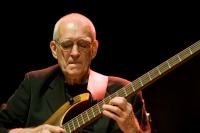
Steve Swallow (born October 4, 1940) is a jazz fusion bassist and composer noted for his collaborations with Jimmy Giuffre, Gary Burton, and Carla Bley. He was one of the first jazz double bassists to switch entirely to electric bass guitar.
Charlie Christian
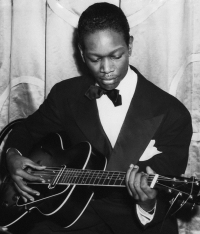
Charles Henry Christian (July 29, 1916 – March 2, 1942) was an American swing and jazz guitarist.Christian was an important early performer on the electric guitar and a key figure in the development of bebop and cool jazz. He gained national exposure as a member of the Benny Goodman Sextet and Orchestra from August 1939 to June 1941. His single-string technique, combined with amplification, helped bring the guitar out of the rhythm section and into the forefront as a solo instrument. For this, he is often credited with leading to the development of the lead guitar role in musical ensembles and bands.
George Gershwin

George Gershwin (September 26, 1898 – July 11, 1937) was an American composer. He wrote most of his vocal and theatrical works in collaboration with his elder brother, lyricist Ira Gershwin. George Gershwin composed songs both for Broadway and for the classical concert hall. He also wrote popular songs with success.
Many of his compositions have been used on television and in numerous films, and many became jazz standards. The jazz singer Ella Fitzgerald recorded many of the Gershwins' songs on her 1959 Gershwin Songbook (arranged by Nelson Riddle). Countless singers and musicians have recorded Gershwin songs, including Fred Astaire, Louis Armstrong, Al Jolson, Bobby Darin, Art Tatum, Bing Crosby, Janis Joplin, John Coltrane, Frank Sinatra, Billie Holiday, Sam Cooke, Miles Davis, Herbie Hancock, Madonna, Judy Garland, Julie Andrews, Barbra Streisand, Marni Nixon, Natalie Cole, Patti Austin, Nina Simone, Maureen McGovern, John Fahey, The Residents, Than & Sam, Sublime, and Sting. A residential building is named after him on the Stony Brook University campus.
Many of his compositions have been used on television and in numerous films, and many became jazz standards. The jazz singer Ella Fitzgerald recorded many of the Gershwins' songs on her 1959 Gershwin Songbook (arranged by Nelson Riddle). Countless singers and musicians have recorded Gershwin songs, including Fred Astaire, Louis Armstrong, Al Jolson, Bobby Darin, Art Tatum, Bing Crosby, Janis Joplin, John Coltrane, Frank Sinatra, Billie Holiday, Sam Cooke, Miles Davis, Herbie Hancock, Madonna, Judy Garland, Julie Andrews, Barbra Streisand, Marni Nixon, Natalie Cole, Patti Austin, Nina Simone, Maureen McGovern, John Fahey, The Residents, Than & Sam, Sublime, and Sting. A residential building is named after him on the Stony Brook University campus.
ABBA

ABBA was a Swedish Eurovision Song Contest-winning pop music group active between 1972 and 1982. Benny Andersson, Björn Ulvaeus, Anni-Frid Lyngstad (Frida), Agnetha Fältskog are in ABBA. They topped the charts worldwide from the mid-1970s to the early 1980s. The name "ABBA" is an acronym formed from the first letters of each of the group member's given name (Agnetha, Björn, Benny, Anni-Frid).
ABBA gained immense international popularity employing catchy song hooks, simple lyrics, and a Wall of Sound achieved by overdubbing the female singers' voices in multiple harmonies. As their popularity grew, they were sought-after to tour Europe, Australia, and North America, drawing crowds of near-hysterical fans ("ABBAholics"), notably in Australia. Touring became a contentious issue, being particularly unpopular with Agnetha, but they continued to release studio albums to great commercial success. At the height of their popularity, however, both marriages of the band members (Benny with Frida, and Björn with Agnetha) failed, and the relationship changes were reflected in their music, as they produced more thoughtful lyrics with different compositions.
They remain a fixture of radio playlists and are one of the world's best selling bands, having sold around 400 million records world wide; The music of ABBA has been re-arranged into the successful musical Mamma Mia! that has toured worldwide and a movie version was released in July 2008. All four of the former members of ABBA were present at the Stockholm premieres of both the musical (2005) and the film (2008). The film première took place at the Benny Andersson-owned Rival theatre at Mariatorget, Stockholm on 4 July 2008.
ABBA gained immense international popularity employing catchy song hooks, simple lyrics, and a Wall of Sound achieved by overdubbing the female singers' voices in multiple harmonies. As their popularity grew, they were sought-after to tour Europe, Australia, and North America, drawing crowds of near-hysterical fans ("ABBAholics"), notably in Australia. Touring became a contentious issue, being particularly unpopular with Agnetha, but they continued to release studio albums to great commercial success. At the height of their popularity, however, both marriages of the band members (Benny with Frida, and Björn with Agnetha) failed, and the relationship changes were reflected in their music, as they produced more thoughtful lyrics with different compositions.
They remain a fixture of radio playlists and are one of the world's best selling bands, having sold around 400 million records world wide; The music of ABBA has been re-arranged into the successful musical Mamma Mia! that has toured worldwide and a movie version was released in July 2008. All four of the former members of ABBA were present at the Stockholm premieres of both the musical (2005) and the film (2008). The film première took place at the Benny Andersson-owned Rival theatre at Mariatorget, Stockholm on 4 July 2008.
Duke Ellington

Edward Kennedy "Duke" Ellington (April 29, 1899 â May 24, 1974) was an American composer, pianist, and bandleader.
Recognized during his life as one of the most influential figures in jazz, if not in all American music, Ellington's reputation has increased since his death, including a special award citation from the Pulitzer Prize Board.
Ellington called his style and sound "American Music" rather than jazz, and liked to describe those who impressed him as "beyond category", including many of the musicians who served with his orchestra, some of whom were themselves considered among the giants of jazz and remained with Ellington's orchestra for decades. While many were noteworthy in their own right, it was Ellington that melded them into one of the most well-known orchestral units in the history of jazz. He often composed specifically for the style and skills of these individuals, such as "Jeep's Blues" for Johnny Hodges, "Concerto for Cootie" ("Do Nothing Till You Hear from Me") for Cootie Williams and "The Mooche" for Tricky Sam Nanton. He also recorded songs written by his bandsmen, such as Juan Tizol's "Caravan" and "Perdido" which brought the "Spanish Tinge" to big-band jazz. After 1941, he frequently collaborated with composer-arranger Billy Strayhorn, who he called his alter-ego.
One of the twentieth century's best-known African-American celebrities, Ellington recorded for many American record companies, and appeared in several films. Ellington and his orchestra toured the United States and Europe regularly before and after World War II. Ellington led his band from 1923 until his death in 1974. His son Mercer Ellington took over the band until his death from cancer in 1996. Paul Ellington, Mercer's youngest son, took over the Orchestra from there and after his mother's passing took over the Estate of Duke and Mercer Ellington.
Recognized during his life as one of the most influential figures in jazz, if not in all American music, Ellington's reputation has increased since his death, including a special award citation from the Pulitzer Prize Board.
Ellington called his style and sound "American Music" rather than jazz, and liked to describe those who impressed him as "beyond category", including many of the musicians who served with his orchestra, some of whom were themselves considered among the giants of jazz and remained with Ellington's orchestra for decades. While many were noteworthy in their own right, it was Ellington that melded them into one of the most well-known orchestral units in the history of jazz. He often composed specifically for the style and skills of these individuals, such as "Jeep's Blues" for Johnny Hodges, "Concerto for Cootie" ("Do Nothing Till You Hear from Me") for Cootie Williams and "The Mooche" for Tricky Sam Nanton. He also recorded songs written by his bandsmen, such as Juan Tizol's "Caravan" and "Perdido" which brought the "Spanish Tinge" to big-band jazz. After 1941, he frequently collaborated with composer-arranger Billy Strayhorn, who he called his alter-ego.
One of the twentieth century's best-known African-American celebrities, Ellington recorded for many American record companies, and appeared in several films. Ellington and his orchestra toured the United States and Europe regularly before and after World War II. Ellington led his band from 1923 until his death in 1974. His son Mercer Ellington took over the band until his death from cancer in 1996. Paul Ellington, Mercer's youngest son, took over the Orchestra from there and after his mother's passing took over the Estate of Duke and Mercer Ellington.
Boots Randolph
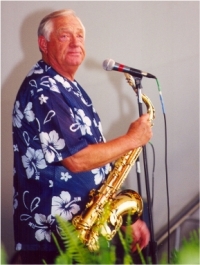
Homer Louis "Boots" Randolph III (June 3, 1927 – July 3, 2007) was an American musician best known for his 1963 saxophone hit "Yakety Sax" (which became Benny Hill's signature tune). Randolph was a major part of the "Nashville sound" for most of his professional career.
Oscar Peterson

Oscar Emmanuel Peterson, CC, CQ, O.Ont. (August 15, 1925 – December 23, 2007) was a Canadian jazz pianist and composer. He was called the "Maharaja of the keyboard" by Duke Ellington, "O.P." by his friends, and was a member of jazz royalty. He released over 200 recordings, won seven Grammy Awards, and received other numerous awards and honours over the course of his career. He is considered to have been one of the greatest jazz pianists of all time, who played thousands of live concerts to audiences worldwide in a career lasting more than 65 years.
Tchaikovsky

Pyotr Il'yich Tchaikovsky (May 7 1840 â November 6 1893) was a Russian composer of the Romantic era. While not part of the nationalistic music group known as "The Five", Tchaikovsky wrote music which, in the opinion of Harold Schonberg, was distinctly Russian: plangent, introspective, with modally-inflected melody and harmony.
Aesthetically, Tchaikovsky remained open to all aspects of Saint Petersburg musical life. He was impressed by Serov and Balakirev as well as the classical values upheld by the conservatory. Both the progressive and conservative camps in Russian music at the time attempted to win him over. Tchaikovsky charted his compositional course between these two factions, retaining his individuality as a composer as well as his Russian identity. In this he was influenced by the ideals of his teacher Nikolai Rubinstein and Nikolai's brother Anton.
Tchaikovsky's musical cosmopolitanism led him to be favored by many Russian music-lovers over the "Russian" harmonies and styles of Mussorgsky, Borodin and Rimsky-Korsakov.
Nonetheless he frequently adapted Russian traditional melodies and dance forms in his music, which enhanced his success in his home country. The success in St. Petersburg at the premiere of his Third Orchestral Suite may have been due in large part to his concluding the work with a polonaise. He also used a polonaise for the final movement of his Third Symphony.
Aesthetically, Tchaikovsky remained open to all aspects of Saint Petersburg musical life. He was impressed by Serov and Balakirev as well as the classical values upheld by the conservatory. Both the progressive and conservative camps in Russian music at the time attempted to win him over. Tchaikovsky charted his compositional course between these two factions, retaining his individuality as a composer as well as his Russian identity. In this he was influenced by the ideals of his teacher Nikolai Rubinstein and Nikolai's brother Anton.
Tchaikovsky's musical cosmopolitanism led him to be favored by many Russian music-lovers over the "Russian" harmonies and styles of Mussorgsky, Borodin and Rimsky-Korsakov.
Nonetheless he frequently adapted Russian traditional melodies and dance forms in his music, which enhanced his success in his home country. The success in St. Petersburg at the premiere of his Third Orchestral Suite may have been due in large part to his concluding the work with a polonaise. He also used a polonaise for the final movement of his Third Symphony.
W.A. Mozart

Wolfgang Amadeus Mozart (German: , full baptismal name Johannes Chrysostomus Wolfgangus Theophilus Mozart (27 January 1756 – 5 December 1791), was a prolific and influential composer of the Classical era. He composed over 600 works, many acknowledged as pinnacles of symphonic, concertante, chamber, piano, operatic, and choral music. He is among the most enduringly popular of classical composers.
Mozart showed prodigious ability from his earliest childhood in Salzburg. Already competent on keyboard and violin, he composed from the age of five and performed before European royalty; at 17 he was engaged as a court musician in Salzburg, but grew restless and traveled in search of a better position, always composing abundantly. While visiting Vienna in 1781, he was dismissed from his Salzburg position. He chose to stay in the capital, where he achieved fame but little financial security. During his final years in Vienna, he composed many of his best-known symphonies, concertos, and operas, and the Requiem. The circumstances of his early death have been much mythologized. He was survived by his wife Constanze and two sons.
Mozart learned voraciously from others, and developed a brilliance and maturity of style that encompassed the light and graceful along with the dark and passionate—the whole informed by a vision of humanity "redeemed through art, forgiven, and reconciled with nature and the absolute." His influence on subsequent Western art music is profound. Beethoven wrote his own early compositions in the shadow of Mozart, of whom Joseph Haydn wrote that "posterity will not see such a talent again in 100 years."
Mozart showed prodigious ability from his earliest childhood in Salzburg. Already competent on keyboard and violin, he composed from the age of five and performed before European royalty; at 17 he was engaged as a court musician in Salzburg, but grew restless and traveled in search of a better position, always composing abundantly. While visiting Vienna in 1781, he was dismissed from his Salzburg position. He chose to stay in the capital, where he achieved fame but little financial security. During his final years in Vienna, he composed many of his best-known symphonies, concertos, and operas, and the Requiem. The circumstances of his early death have been much mythologized. He was survived by his wife Constanze and two sons.
Mozart learned voraciously from others, and developed a brilliance and maturity of style that encompassed the light and graceful along with the dark and passionate—the whole informed by a vision of humanity "redeemed through art, forgiven, and reconciled with nature and the absolute." His influence on subsequent Western art music is profound. Beethoven wrote his own early compositions in the shadow of Mozart, of whom Joseph Haydn wrote that "posterity will not see such a talent again in 100 years."
Howard Dietz and Arthur Schwartz
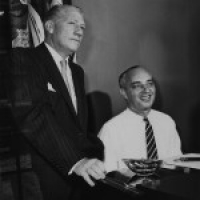
Howard Dietz and Arthur Schwartz, the creators (lyricist and composer respectively) of the durable standards “Dancing in the Dark,” “That’s Entertainment,” “You and the Night and the Music,” and “I Guess I’ll Have To Change My Plan,” collaborated on 11 Broadway shows, most of them revues and most of them successful, over the course of 34 years. Theirs was not an exclusive partnership; Dietz also set lyrics to the tunes, sometimes entire musical scores, of Jerome Kern, Kurt Weill, Vernon Duke, Jimmy McHugh, Ralph Rainger, and Sammy Fain, while Schwartz occasionally wrote music for wordsmiths Ira Gershwin, Leo Robin, Frank Loesser, Dorothy Fields, Johnny Mercer, “Yip” Harburg, and Al Stillman.
tony williams
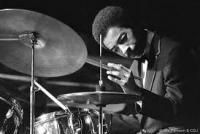
Anthony Tillmon Williams (December 12, 1945 – February 23, 1997) was an American jazz drummer.Williams first gained fame in the band of trumpeter Miles Davis and pioneered jazz fusion. He was inducted into the Modern Drummer Hall of Fame in 1986. He studied with drummer Alan Dawson at an early age, and began playing professionally at the age of 13 with saxophonist Sam Rivers. Saxophonist Jackie McLean hired Williams when he was 16.
Incognito

Incognito is a British acid jazz band. Their debut album, Jazz Funk, was released in 1981. Jean-Paul 'Bluey' Maunick is the band's leader, singer, guitarist, composer, and record producer.
Michael Buble

Michael Steven Bublé (born 9 September 1975) is a Canadian big band singer. He won several awards, including a Grammy and multiple Juno Awards. While achieving modest chart success in the United States, his 2003 self-titled album has reached the top ten in Lebanon, the UK and his home country. However, he did find commercial success in the U.S. with his 2005 album It's Time. He has sold over 18 million albums. Michael has also appeared on the TV series Rove four times.
The album Michael Bublé was released by Warner Bros. Records just before Valentine's Day in 2003. The album was actually first released by the Warner company in South Africa, where the album went into the Top 5 and was certified Gold. Soon after that, it entered the Canadian album charts. As success in the USA was marginal at best, Bublé started visiting countries all over the world, with the album being successful in places like the Philippines and Singapore. He then moved on to placed like Italy and eventually had chart success in the UK, U.S., Australia and elsewhere soon followed with the album going Platinum and reaching the top ten of the album charts in the UK and Canada and going all the way to #1 in Australia. The album has reached the top 50 of the Billboard 200 album charts in the U.S. His version of George Michael's "Kissing a Fool" was released as a single from the album and reached the top 30 of the Billboard Hot Adult Contemporary Tracks chart. "How Can You Mend a Broken Heart?" reached the top 30 of the Billboard Adult Contemporary chart as well. His third single "Sway" also reached the top 30 of the Adult Contemporary chart, while a Junkie XL remix of the song reached the top 20 in Australia in May 2004.
Bublé's second studio album, It's Time, debuted as a hugely successful performance. The album reached number 7 on the Billboard 200 album chart and number 2 on the ARIA Album Charts in Australia. It's Time also debuted at number 4 on the UK Album Charts. The album features covers of Beatles and Ray Charles songs, and the hit single "Home".
The album Michael Bublé was released by Warner Bros. Records just before Valentine's Day in 2003. The album was actually first released by the Warner company in South Africa, where the album went into the Top 5 and was certified Gold. Soon after that, it entered the Canadian album charts. As success in the USA was marginal at best, Bublé started visiting countries all over the world, with the album being successful in places like the Philippines and Singapore. He then moved on to placed like Italy and eventually had chart success in the UK, U.S., Australia and elsewhere soon followed with the album going Platinum and reaching the top ten of the album charts in the UK and Canada and going all the way to #1 in Australia. The album has reached the top 50 of the Billboard 200 album charts in the U.S. His version of George Michael's "Kissing a Fool" was released as a single from the album and reached the top 30 of the Billboard Hot Adult Contemporary Tracks chart. "How Can You Mend a Broken Heart?" reached the top 30 of the Billboard Adult Contemporary chart as well. His third single "Sway" also reached the top 30 of the Adult Contemporary chart, while a Junkie XL remix of the song reached the top 20 in Australia in May 2004.
Bublé's second studio album, It's Time, debuted as a hugely successful performance. The album reached number 7 on the Billboard 200 album chart and number 2 on the ARIA Album Charts in Australia. It's Time also debuted at number 4 on the UK Album Charts. The album features covers of Beatles and Ray Charles songs, and the hit single "Home".
Schumann

Robert Schumann, sometimes given as Robert Alexander Schumann, (June 8, 1810 – July 29, 1856) was a German composer, aesthete and influential music critic. He is one of the most famous Romantic composers of the 19th century.
He had hoped to pursue a career as a virtuoso pianist, having been assured by his teacher Friedrich Wieck that he could become the finest pianist in Europe after only a few years of study with him. However, a hand injury prevented those hopes from being realized, and he decided to focus his musical energies on composition. Schumann's published compositions were, until 1840, all for the piano; he later composed works for piano and orchestra, many lieder (songs for voice and piano), four symphonies, an opera, and other orchestral, choral and chamber works. His writings about music appeared mostly in the Neue Zeitschrift für Musik ("The New Journal for Music"), a Leipzig-based publication that he jointly founded.
In 1840, after a long and acrimonious legal battle with his piano instructor Friedrich Wieck, Schumann married Wieck's daughter, pianist Clara Wieck, a considerable figure of the Romantic period in her own right. Clara Wieck showcased many works by her husband as well. For the last two years of his life, after an attempted suicide, Schumann was confined to a mental institution.
He had hoped to pursue a career as a virtuoso pianist, having been assured by his teacher Friedrich Wieck that he could become the finest pianist in Europe after only a few years of study with him. However, a hand injury prevented those hopes from being realized, and he decided to focus his musical energies on composition. Schumann's published compositions were, until 1840, all for the piano; he later composed works for piano and orchestra, many lieder (songs for voice and piano), four symphonies, an opera, and other orchestral, choral and chamber works. His writings about music appeared mostly in the Neue Zeitschrift für Musik ("The New Journal for Music"), a Leipzig-based publication that he jointly founded.
In 1840, after a long and acrimonious legal battle with his piano instructor Friedrich Wieck, Schumann married Wieck's daughter, pianist Clara Wieck, a considerable figure of the Romantic period in her own right. Clara Wieck showcased many works by her husband as well. For the last two years of his life, after an attempted suicide, Schumann was confined to a mental institution.
Mshell Ndegeocello
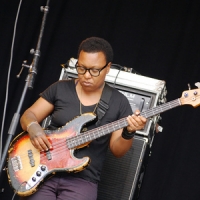
Michelle Lynn Johnson, better known as Meshell Ndegeocello (/mɪˈʃɛl ndɛˈɡeɪoʊtʃɛloʊ/; born August 29, 1968), is an American singer-songwriter, rapper, and bassist. She has gone by the name Meshell Suhaila Bashir-Shakur which is used as a writing credit on some of her later work. Her music incorporates a wide variety of influences, including funk, soul, jazz, hip hop, reggae and rock. She has received significant critical acclaim throughout her career, and although she has never won a Grammy Award, she has been nominated ten times. She has been credited for helping to have "sparked the neo-soul movement."
Alex Kapranos

Alexander Paul Kapranos Huntley (born 20 March 1972) is a Scottish musician, singer, songwriter, record producer, and author. He is best known as the lead singer and guitarist of Scottish rock band Franz Ferdinand. He has also been a part of the supergroups FFS and BNQT.
Henry Mancini

Henry Mancini (April 16, 1924 – June 14, 1994) was an American composer, conductor and arranger. He is remembered particularly for being a composer of film and television scores. Mancini also won a record number of Grammy awards, including a Grammy Lifetime Achievement Award in 1995. His best-known works are the jazz-idiom theme to The Pink Panther film series ("The Pink Panther Theme"), the Peter Gunn Theme (from the so-named series) and "Moon River".
Mancini was nominated for an unprecedented 72 Grammys, winning 20. Additionally he was nominated for 18 Academy Awards, winning four. He also won a Golden Globe Award and was nominated for two Emmys.
Mancini won a total of four Oscars for his music in the course of his career. He was first nominated for an Academy Award in 1955 for his original score of The Glenn Miller Story, on which he collaborated with Joseph Gershenson. He lost out to Adolph Deutsch and Saul Chaplin's Seven Brides for Seven Brothers. In 1962 he was nominated in the Best Music, Original Song category for "Bachelor in Paradise" from the film of the same name, in collaboration with lyricist Mack David. That song did not win. However, Mancini did receive two Oscars that year: one in the same category, for the song "Moon River" (shared with lyricist Johnny Mercer), and one for "Best Music, Scoring of a Dramatic or Comedy Picture" for Breakfast at Tiffany's. The following year, he and Mercer took another Best Song award for "Days of Wine and Roses," another eponymous theme song. His next eleven nominations went for naught, but he finally garnered one last statuette working with lyricist Leslie Bricusse on the score for Victor/Victoria, which won the "Best Music, Original Song Score and Its Adaptation or Best Adaptation Score" award for 1983. All three of the films for which he won were directed by Blake Edwards. His score for Victor/Victoria was adapted for the 1995 Broadway musical of the same name.
Mancini was nominated for an unprecedented 72 Grammys, winning 20. Additionally he was nominated for 18 Academy Awards, winning four. He also won a Golden Globe Award and was nominated for two Emmys.
Mancini won a total of four Oscars for his music in the course of his career. He was first nominated for an Academy Award in 1955 for his original score of The Glenn Miller Story, on which he collaborated with Joseph Gershenson. He lost out to Adolph Deutsch and Saul Chaplin's Seven Brides for Seven Brothers. In 1962 he was nominated in the Best Music, Original Song category for "Bachelor in Paradise" from the film of the same name, in collaboration with lyricist Mack David. That song did not win. However, Mancini did receive two Oscars that year: one in the same category, for the song "Moon River" (shared with lyricist Johnny Mercer), and one for "Best Music, Scoring of a Dramatic or Comedy Picture" for Breakfast at Tiffany's. The following year, he and Mercer took another Best Song award for "Days of Wine and Roses," another eponymous theme song. His next eleven nominations went for naught, but he finally garnered one last statuette working with lyricist Leslie Bricusse on the score for Victor/Victoria, which won the "Best Music, Original Song Score and Its Adaptation or Best Adaptation Score" award for 1983. All three of the films for which he won were directed by Blake Edwards. His score for Victor/Victoria was adapted for the 1995 Broadway musical of the same name.
Joshua Breakstone
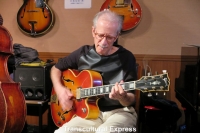
Breakstone came into contact with the music business early in life through his parents and siblings. His sister was a lighting technician at the Fillmore East theater, where he saw musicians such as Jimi Hendrix and Frank Zappa. Later, he became interested in jazz and was influenced by Charlie Parker and Lee Morgan. He studied with guitarist Sal Salvador in Manhattan. In 1972, he enrolled at the New College of the University of South Florida and graduated three years later. He continued studies at Berklee College of Music.
Jeff Lorber
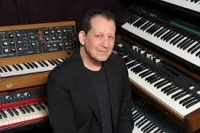
Jeffrey H. Lorber (born November 4, 1952) is an American keyboardist, composer, and record producer. After six previous nominations, Lorber won his first Grammy Award on January 28, 2018 for Best Contemporary Instrumental Album for Prototype by his band The Jeff Lorber Fusion.Many of his songs have appeared on The Weather Channel's Local on the 8s segments and on the channel's compilation albums, The Weather Channel Presents: The Best of Smooth Jazz and The Weather Channel Presents: Smooth Jazz II. He was nominated for a Grammy Award for his album He Had a Hat (Blue Note, 2007)
Johann Strauss

Johann Strauss I (March 14, 1804 – September 25, 1849; German: Johann Baptist Strauß, Johann Strauss (Vater); also Johann Baptist Strauss, Johann Strauss, Sr., the Elder, the Father), born in Vienna, was an Austrian Romantic composer famous for his waltzes, and for popularizing them alongside Joseph Lanner, thereby setting the foundations for his sons to carry on his musical dynasty. His most famous piece is probably the Radetzky March (named after Joseph Radetzky von Radetz), while his most famous waltz is probably the Lorelei Rheinklänge, Op. 154.
Bill Evans

William John Evans, known as Bill Evans (August 16, 1929 – September 15, 1980) was an American jazz pianist. His use of impressionist harmony, inventive interpretation of traditional jazz repertoire, and trademark rhythmically independent, "singing" melodic lines influenced a generation of pianists, including Chick Corea, Herbie Hancock, John Taylor, Steve Kuhn, Don Friedman, Denny Zeitlin, Bobo Stenson and Keith Jarrett, as well as guitarists Lenny Breau and Pat Metheny. The music of Bill Evans continues to inspire younger pianists like Marcin Wasilewski, Fred Hersch, Ray Reach, Bill Charlap, Lyle Mays, Eliane Elias and arguably Brad Mehldau, early in his career.
Evans is an inductee of the Down Beat Jazz Hall of Fame.
Evans is an inductee of the Down Beat Jazz Hall of Fame.
Mozart

Wolfgang Amadeus Mozart, full name Johann Chrysostom Wolfgang Amadeus Mozart (27 January 1756 â 5 December 1791) was a prolific and influential composer of the Classical era. His over 600 compositions include works widely acknowledged as pinnacles of symphonic, concertante, chamber, piano, operatic, and choral music. Mozart is among the most enduringly popular of classical composers, and many of his works are part of the standard concert repertoire.
Mozart's music, like Haydn's, stands as an archetypal example of the Classical style. His works spanned the period during which that style transformed from one exemplified by the style galant to one that began to incorporate some of the contrapuntal complexities of the late Baroque, complexities against which the galant style had been a reaction. Mozart's own stylistic development closely paralleled the development of the classical style as a whole. In addition, he was a versatile composer and wrote in almost every major genre, including symphony, opera, the solo concerto, chamber music including string quartet and string quintet, and the piano sonata. While none of these genres were new, the piano concerto was almost single-handedly developed and popularized by Mozart. He also wrote a great deal of religious music, including masses; and he composed many dances, divertimenti, serenades, and other forms of light entertainment.
The central traits of the classical style can be identified in Mozart's music. Clarity, balance, and transparency are hallmarks of his work.
Mozart's music, like Haydn's, stands as an archetypal example of the Classical style. His works spanned the period during which that style transformed from one exemplified by the style galant to one that began to incorporate some of the contrapuntal complexities of the late Baroque, complexities against which the galant style had been a reaction. Mozart's own stylistic development closely paralleled the development of the classical style as a whole. In addition, he was a versatile composer and wrote in almost every major genre, including symphony, opera, the solo concerto, chamber music including string quartet and string quintet, and the piano sonata. While none of these genres were new, the piano concerto was almost single-handedly developed and popularized by Mozart. He also wrote a great deal of religious music, including masses; and he composed many dances, divertimenti, serenades, and other forms of light entertainment.
The central traits of the classical style can be identified in Mozart's music. Clarity, balance, and transparency are hallmarks of his work.
Kenny Garrett
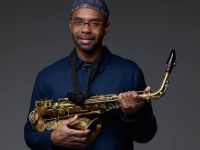
Kenny Garrett is a Grammy Award-winning American post-bop jazz saxophonist and flautist who gained recognition in his youth as a member of the Duke Ellington Orchestra and of Miles Davis's band. Since then, he has pursued a solo career
Harry Connick Jr.
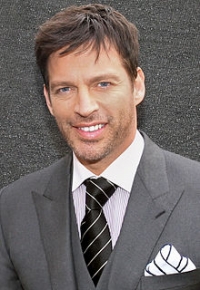
Joseph Harry Fowler Connick Jr. (born September 11, 1967) is an American singer, composer, actor, and television host. He has sold over 28 million albums worldwide. Connick is ranked among the top 60 best-selling male artists in the United States by the Recording Industry Association of America, with 16 million in certified sales. He has had seven top 20 US albums, and ten number-one US jazz albums, earning more number-one albums than any other artist in US jazz chart history.
Connick's best-selling album in the United States is his Christmas album When My Heart Finds Christmas (1993). His highest-charting album is his release Only You (2004), which reached No. 5 in the US and No. 6 in Britain. He has won three Grammy Awards and two Emmy Awards. He played Grace Adler’s husband, Leo Markus, on the NBC sitcom Will & Grace from 2002 to 2006.
Connick's best-selling album in the United States is his Christmas album When My Heart Finds Christmas (1993). His highest-charting album is his release Only You (2004), which reached No. 5 in the US and No. 6 in Britain. He has won three Grammy Awards and two Emmy Awards. He played Grace Adler’s husband, Leo Markus, on the NBC sitcom Will & Grace from 2002 to 2006.
Glenn Miller Orchestra
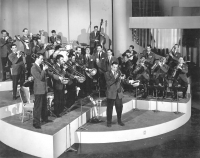
This article is about the band that Glenn Miller fronted. For the band that performed after his disappearance, see Glenn Miller Orchestra (1956–present).
Glenn Miller and His Orchestra
Glenn Miller Band.jpg
Glenn Miller and His Orchestra, on the set of Sun Valley Serenade, 1941
Background information
Genres Dance band, Swing
Years active April 1938 – September 1942
Labels
Bluebird Victor
Website www.glennmiller.com
Past members see members section
Glenn Miller and His Orchestra was an American swing dance band formed by Glenn Miller in 1938. Arranged around a clarinet and tenor saxophone playing melody, and three other saxophones playing harmony, the band became the most popular and commercially successful dance orchestra of the Swing era and one of the greatest singles charting acts of the 20th century.
Miller began professionally recording in New York City as a sideman in the Hot jazz era of the late 1920s. With the arrival of virtuoso trombonists Jack Teagarden and Tommy Dorsey, Miller focused more on developing his arrangement skills. Writing for contemporaries and future stars such as Artie Shaw, and Benny Goodman, Miller gained prowess as an arranger by working in a variety of settings. Later, Miller largely improved his arranging and writing skills by studying under music theorist Joseph Schillinger.
In February 1937, Miller started an orchestra that briefly made records for Decca. With this group, Miller used an arrangement he wrote for British bandleader Ray Noble's American band in an attempt to form a clarinet-reed sound. This style developed over time, and eventually became known as the Glenn Miller sound. Frustrated with his agency over playing inconsistent bookings and lacking broad radio exposure, Miller gave the band notice in December 1937. Less than three months later, he was looking for members and forming a new band.
Miller began a partnership with Eli Oberstein, which led directly to a contract with Victor subsidiary Bluebird Records. Gaining notoriety at such engagements as the Paradise Restaurant and Frank Dailey–owned Meadowbrook and their corresponding nationwide broadcasts, Miller struck enormous popularity playing the Glen Island Casino in the summer of 1939. From late 1939 to mid-1942, Miller was the number-one band in the country, with few true rivals. Only Harry James' band began to equal Miller's in popularity as he wound down his career in the wake of the Second World War. The AFM strike prevented Miller from making any new recordings in the last two months of his band's existence, and they formally disbanded at the end of September 1942.
Miller's short-term chart successes have seldom been duplicated and his group's unprecedented dominance of early Your Hit Parade and Billboard singles charts, resulting in 16 number-one singles and 69 Top Ten hits, foreshadowed future record-breaking chart acts such as Elvis Presley and The Beatles.
Contents
1 Musical success
1.1 Beginnings
1.2 Glen Island Casino and Meadowbrook
1.3 Nationwide popularity
2 Radio success
3 Chart success
4 Past members
5 Discography
5.1 Singles
6 See also
7 References
8 External links
Musical success
Beginnings
By March 1938, Glenn was planning to form a new group. The newly reformed band featured several longtime associates of Miller. From his first orchestra, Miller invited back Hal McIntyre, and hired Paul Tanner, Wilbur Schwartz, Ray Eberle (who was the younger brother of Jimmy Dorsey's vocalist Bob Eberly), and his old friend Chummy MacGregor. Miller's perseverance, business expertise, combined with a penchant for showmanship and musical taste, provided the faith for financiers Mike Nidorf and Cy Shribman. Miller used the 'clarinet-lead' sound as the foundation for his new band, and this caught the attention of students at Northeastern campuses. They opened on April 16, 1938, at Raymor Ballroom in Boston. When the band reached New York, they were billed below Freddie Fisher and His Schnickelfritzers, a dance band comedy routine. From Vincent Lopez's group came Marion Hutton, who added enthusiasm and energy in her performances. On September 7, 1938, the band made their first recordings, "My Reverie", "King Porter Stomp" and "By the Waters of Minnetonka", in two parts. Keeping up radio dates, Miller was only booked for 1 more session the rest of the year.
Glen Island Casino and Meadowbrook
In March 1939, the Glenn Miller Orchestra was given its big break, when they were chosen to play the summer season at the prestigious Glen Island Casino located on the north shore of Long Island Sound in New Rochelle, New York. Frank Dailey, manager of The Meadowbrook Ballroom in Cedar Grove, New Jersey, immediately booked the band for a four-week stay in March and April, before Glen Island. The band was well-received and within days Dailey picked up a three-week extension offer. During this time, Bluebird recording dates became more common and Glenn added drummer Maurice Purtill and trumpeter Dale "Mickey" McMickle to stabilize personnel. Opening at Glen Island on May 17, 1939, the casino's radio broadcast antenna ensured the Miller band was heard around the country. In late August, the end of their summer season, they had nationwide attention.
George T. Simon, writer and one-time drummer for Miller, spoke of the Glen Island broadcasts:
Glen Island was the prestige place for people who listened to bands on radio. The band's first semi hit, "Little Brown Jug", came out just when it opened at Glen Island. That helped. And the clarinet lead in Glenn's arrangements was such a romantic sound! It caught the public fancy during this exposure. Miller began ending his broadcasts from Glen Island with his "Something Old, Something New" medleys. But the most important thing for Glenn's success was that he recorded "In the Mood" while he was at the casino. That made him the Michael Jackson of his day.
Nationwide popularity
Capitalizing on newfound popularity, Miller decided to add a trombone and a trumpet, giving the band a fuller sound. On April 4, 1939, Miller and his orchestra recorded "Moonlight Serenade". Considered one of the top songs of the swing era, and Miller's best composition, it soon became the theme song to start and end all of his radio performances.
Miller's most popular track "In the Mood" was recorded August 1, 1939. Famous for its opening and bass riffs as well as its "dueling" saxophone solos between Tex Beneke and Al Klink, the song hit number one on the Billboard charts, staying for a total of 30 weeks. Joe Garland compiled the song from riffs he'd heard in other songs, and is credited on the label. Elements of "In the Mood" can be found in earlier jazz recordings, such as Jimmy O'Bryant's "Clarinet Getaway", Wingy Manone's "Tar Paper Stomp", and Fletcher Henderson's "Hot and Anxious." Garland put these pieces together and initially offered the song, in a six-minute form, to Artie Shaw. Despite playing it for radio broadcast, Shaw found no success with it in this form. Miller purchased the song in June 1939 and asked Eddie Durham to arrange it for his orchestra, and Miller made final tweaks in Victor studios. In a 2000 interview for npr, trombonist Paul Tanner remembered recording the song and playing it live:
He would say, "You fellas do this, and you fellas do that, and let's hear it once." And then, "We're gonna cut from this spot to this spot in the arrangement, and in here we're gonna put a trumpet solo. And in this spot and this spot we're gonna cut way down here and we're gonna have the two saxophones have a little battle in there," and decided to make cuts. And then at the end, Alice , if you know the arrangement, at the end there are all those false endings that go on, and it kept getting softer and softer until Glenn would give the drummer a clue and he would hit the cowbell and then we would know that the next time we were to come on very loud. And the dancers just loved it. He tried it out on the dances at the Glen Island Casino, and they loved it. They couldn't figure out how we knew when to come in loud. But, you know, I told them, "Well, we have a sixth sense of that sort of thing." But actually, what happened is the drummer hit the cowbell, and we knew the next time was loud. And this was all Glenn's doing.
On February 5, 1940, Miller recorded "Tuxedo Junction", which hit number one and reportedly sold 115,000 copies within the first week of release, and placed 7th overall for the National Hit Parade that year. Bob Eberly said that it "sold 90,000 copies in the first week, at a time when 25,000 was considered a great seller". In April, the band chant track "Pennsylvania 6-5000", referencing the phone number for the Hotel Pennsylvania, which housed the Café Rouge, a common engagement and broadcasting spot for the band, was released and it too became an instant swing standard.
On January 1, 1941, following tensions regarding licensing fees, radio networks banned ASCAP songs from live performance. Miller had to work to reform his radio programs for BMI published tunes, temporarily switching his theme to "Slumber Song". In early 1941, Marion Hutton left the band to go on maternity leave. In the meantime, Miller needed an additional female vocalist, and he offered Dorothy Claire, then with Bobby Byrne's band, twice her salary. Claire went to work for Miller, despite her signature on a three-year contract with Byrne in November 1940, and Miller ignored Byrne's wishes for compensation. Byrne then launched a $25,000 lawsuit against the Miller orchestra's business dealings. Miller met with Byrne in Columbus, Ohio sometime in early March and settled the dispute – Claire went back to working with Byrne's band. Miller soon hired The Modernaires from Paul Whiteman, who was disbanding his orchestra. Still in need of a female vocalist, the wife of Modernaire Hal Dickinson, Paula Kelly, who had sung previously with Al Donahue, stepped up to fill in the role. The signing of the Modernaires significantly benefitted the Miller organization. Hip and popular with young listeners, the Modernaires' vocal range added a new dimension to Miller's recordings.
In late March, Miller and his orchestra began work on their first motion picture, Sun Valley Serenade. Previously, swing films such as Hollywood Hotel with Benny Goodman's orchestra had only featured bands for song performances; Miller reportedly insisted, perhaps even to the extent of contract clauses, that the plot of Sun Valley revolve around the band rather than only feature them. Harry Warren and Mack Gordon were commissioned to write songs for the film. The Miller band filmed and recorded an extended song-and-dance number featuring the Nicholas Brothers for what was soon to be its biggest selling record, surprise hit "Chattanooga Choo Choo". Despite criticism of the plot, Sun Valley Serenade was received with general positivity from critics, and Miller earned praise for his band's role in the film, with Barry Ulanov writing for Metronome:
Miller comes across as a convincing band leader, and, even more important, a convincing human being in this film. He’s on mostly for music, but most of the film is music and the dozen or so reels are a better showcase for the Glenn Miller band than they are for the Sonja Henie torso and limbs, with and without skates. Never has a movie made more of a popular band and never has a movie featuring such an organization presented its music so tastefully... Pictorially, Trigger Alpert and Maurice Purtill take the honors. Trigger hops around like mad and Maurice looks like the movies’ idea of a swing drummer, all right. They stay within the bounds of good taste, however ... the story is believable, and happily centers around the band, so that the whole thing is a triumph for Glenn Miller and the band.
Billboard top 10 chart for January 24, 1942, where Glenn Miller and His Orchestra hold five of the slots.
In October, ASCAP and the radio networks agreed on a new rate, and the band could finally play "Chattanooga" and their other songs on radio. W. Wallace Early, the manager of record sales for RCA Victor and Bluebird Records, presented the first ever gold record to Miller on February 10, 1942, saying:
It's a pleasure to be here tonight. And speaking of RCA Victor, we're mighty proud of that Chattanooga Choo Choo, and the man that made the record, Glenn Miller. You see it's been a long time – 15 years in fact – since any record has sold a million copies. And Chattanooga Choo Choo certainly put on steam and breezed right through that million mark by over 200,000 pressings. And we decided that Glenn should get a trophy. The best one we could think of is a gold record of Chattanooga. And now Glenn, it's yours – with the best wishes of RCA Victor Bluebird Records.
After the Pearl Harbor attack, Miller began incorporating more patriotic themes into his radio shows and recordings.
In early 1942, the band was upgraded from Bluebird to full-price Victor Records. Following very closely in the footsteps of its predecessor, the Miller band started work on their second film, Orchestra Wives in March. Once again, Gordon and Warren were recalled to compose the songs. The previous year, both had composed "At Last" but couldn't place it into Sun Valley Serenade. They worked over the arrangement, and it was displayed prominently in Orchestra Wives. Years later, it became a standard when recorded by Etta James. Akin to "Chattanooga", "(I've Got a Gal In) Kalamazoo" was filmed as a song and dance number featuring the Nicholas Brothers and also sold a million pressings, with Billboard ranking it among the most popular records of the year.
In mid–July, Miller and the band recorded thirteen sides, as James Petrillo, chief of the musicians' union, embarked on a 28-month recording ban. The strike prevented Miller from making additional records in his career, although Victor slowly released the last set of tracks, with "That Old Black Magic" hitting number one in May 1943, over eight months after his band ceased to exist.
Miller began privately sending letters to the Armed Forces in attempts to lead a modern military band. Accepted into the United States Navy and later transferred to the Army Air Forces, in early September he broke the news to the band and later that month they played their last radio shows. Miller surrendered his Chesterfield radio slot to Harry James.
Radio success
Radio played a pivotal role in the success of Miller and His Orchestra. Featured heavily on the format during their existence, many of their earlier programs from such venues as the Paradise Restaurant, Glen Island and the Meadowbrook Ballroom used remote connections to the National Broadcasting Company, on both NBC–Red and NBC–Blue.
The makers of Chesterfield Cigarettes hosted a half-hour radio show on CBS that featured King of Jazz Paul Whiteman. Whiteman decided to retire and recommended Glenn as a replacement. On December 27, 1939, Miller took over the program as Chesterfield Moonlight Serenade. During the first 13 weeks, The Andrews Sisters were featured as Chesterfield were worried over whether Miller could sustain his popularity. Their fear subsided, and the program, reformatted for 15 minutes, aired Tuesday, Wednesday and Thursday nights at 10:15pm. Miller and his band held the slot until their disbandment in 1942.
In 1940, the band broadcast from the first time from the Café Rouge at the Hotel Pennsylvania, soon to become a regular booking and a host of long-term engagements. By then, the Miller band had several NBC sustaining broadcasts in addition to three CBS programs, reaching American homes 6–7 days a week. In August, Miller's orchestra had an hour-long program on NBC–Blue, Glenn Miller's Sunset Serenade featuring prizes Miller paid for out-of-pocket. A review in Billboard commented, "Unusual length of the program allows Miller to display all the top items in his library."
Chart success
According to Paul Albone, of the 121 singles by Glenn Miller and His Orchestra that made the charts, 69 were Top Ten hits, and 16 reached number-one. In just a 4-year career, Miller and His Orchestra's songs spent a cumulative total of 664 weeks, nearly thirteen years, on the charts, 79 of which were at the number-one position. Miller also has the distinction of three posthumous albums reaching number-one on Billboard charts: Glenn Miller in 1945, its follow-up in 1947, and his original recordings repackaged for the release of The Glenn Miller Story in 1954.
Past members
Ray Anthony, who played trumpet with the band from 1940 to 1941, is the last surviving member as of 2019.
Discography
See also: Glenn Miller discography
Singles
Million-selling singles:
1939: "Little Brown Jug"
1939: "Moonlight Serenade"
1939: "In the Mood"
1940: "Tuxedo Junction"
1940: "Pennsylvania 6-5000"
1941: "Chattanooga Choo Choo"
1941: "A String of Pearls"
1941: "Moonlight Cocktail"
1942: "American Patrol"
1942: "(I've Got a Gal In) Kalamazoo"
See also
Glenn Miller
Swing music
Bandleader
Big band
References
"A Portrait of Glenn Miller" (PDF). www.colorado.edu. Glenn Miller Archive.
Gilliland, John (1994). Pop Chronicles the 40s: The Lively Story of Pop Music in the 40s (audiobook). ISBN 978-1-55935-147-8. OCLC 31611854. Tape 2, side A.
"Top Ten Hits 1939-1943" (PDF). colorado.edu. Glenn Miller Archive. September 2017. Retrieved October 12, 2018.
"Captain Swing - Glenn Miller - America in WWII magazine". www.americainwwii.com.
"A Bluebird Reverie – The First RCA Session". 1 April 2014.
Settlemier, Tyrone. "The Online 78 rpm Discographical Project". www.78discography.com.
"POP/JAZZ; GLENN MILLER SOUND OF 1939 AT GLEN ISLAND CASINO".
"Glenn Miller Orchestra – History". glennmillerorchestra.com.
http://ww Archived 2013-07-12 at the Wayback Machine w.glennmiller.com/index.php
"Army Band Hits High Note With Community".
Tsort. "Song title 150 - In the Mood". tsort.info.
""In the Mood"—Glenn Miller (1939)" (PDF). Library of Congress.
Spragg, Dennis. "In the Mood" (PDF). www.colorado.edu. Glenn Miller Archive.
"'In the Mood'". National Public Radio.
Simon, George T. Glenn Miller and His Orchestra. NY: Crowell, 1974.
Spragg, Dennis. "Sun Valley Serenade 75th Anniversary Commemoration" (PDF). Glenn Miller Archive.
Crowther, Bosley. "Sonia Henie in 'Sun Valley Serenade,' a Sparkling and Melodious Outdoor Picture, at the Roxy". The New York Times.
Murrells, Joseph (1978). The Book of Golden Discs (2nd ed.). London: Barrie and Jenkins Ltd. p. 4. ISBN 0-214-20512-6.
"Radio Recordings" (PDF). colorado.edu. Glenn Miller Archive.
Carter, Dick (January 3, 1942). "On the Air: Glenn Miller". Billboard. Retrieved 26 October 2014.
Whitburn, Joel. Pop Memories (1900-1940). Record Research.
Whitburn, Joel (2015). Pop Hits Singles and Albums, 1940-1954. Record Research. ISBN 978-0-89820-198-7.
Popa, Christopher. "Record Sales". Big Band Library.
External links
Wikimedia Commons has media related to Glenn Miller Orchestra.
Website of past vocalist Eileen Burns
YouTube Videos from 1983 GMO US and Japan Tour
vte
Glenn Miller and His Orchestra
Discography Timeline of members, 1938–1942
Number one hits
1939
"Wishing (Will Make It So)" "Stairway to the Stars" "Moon Love" "Over the Rainbow" "The Man With the Mandolin" "Blue Orchids" "In the Mood"
1940
"Tuxedo Junction" "The Woodpecker Song"
1941
"Song of the Volga Boatmen" "Chattanooga Choo Choo" "Elmer's Tune"
1942
"A String of Pearls" "Moonlight Cocktail" "(I've Got a Gal In) Kalamazoo"
1943
"That Old Black Magic"
Albums
Up Swing (1944) Smoke Rings (1944) Glenn Miller (1945) Glenn Miller Masterpieces, Volume II (1947) Glenn Miller Plays Selections From the Film "The Glenn Miller Story" (1954) The Glenn Miller Carnegie Hall Concert (1958) Pure Gold (1975)
Members
Vocalists
Marion Hutton Ray Eberle Tex Beneke Jack Lathrop Ernie Caceres Kay Starr Dorothy Claire Paula Kelly The Modernaires Skip Nelson
Musicians
Al Klink Al Mastren Paul Tanner Toby Tyler Tommy Mack Frank D’Annolfo Howard Gibeling Jimmy Priddy Wilbur Schwartz Stanley Aronson Hal McIntyre Tex Beneke Ernie Caceres Jimmy Abato Gabe Galinas Hal Tennyson Benny Feman Babe Russin Skip Martin Johnny Austin Lou Mucci Bob Price Charlie Hill Legh Knowles Mickey McMickle Clyde Hurley Johnny Best Zeke Zarchy Charles Frankhauser Billy May Ray Anthony Alec Fila Bill Graham Steve Lipkins Allan Reuss Arthur Ens Dick Fisher Jack Lathrop Bobby Hackett Bill Conway Chummy MacGregor Bob Spangler Cody Sandifer Frankie Carlson Maurice Purtill Rollie Bundock Tony Carlson Trigger Alpert Doc Goldberg
Arrangers
Jerry Gray Bill Finegan Glenn Miller Billy May
Composers
Glenn Miller Harry Warren Mack Gordon
Army Air Force
band alumni
The Crew Chiefs Addison Collins Jr. Johnny Desmond Peanuts Hucko Jack Lathrop Norman Leyden Ray McKinley Artie Malvin Ralph Patt Mel Powell George Siravo Charlie Spivak
Media
Films
Sun Valley Serenade (1941) Orchestra Wives (1942) The Glenn Miller Story (1954)
Publications
125 Jazz Breaks for Trombone (1927) Glenn Miller's Method for Orchestral Arranging (1943)
Related
List of songs written by Glenn Miller Dorsey Brothers Orchestra The Glenn Miller Story (Decca) (1954) Glenn Miller Orchestra (1956–present) Glenn Miller Time
Authority control Edit this at Wikidata
ISNI: 0000 0001 1536 8834 MusicBrainz: 9b87c1f6-23ae-469b-b710-ea5da2d3f848
Glenn Miller and His Orchestra
Glenn Miller Band.jpg
Glenn Miller and His Orchestra, on the set of Sun Valley Serenade, 1941
Background information
Genres Dance band, Swing
Years active April 1938 – September 1942
Labels
Bluebird Victor
Website www.glennmiller.com
Past members see members section
Glenn Miller and His Orchestra was an American swing dance band formed by Glenn Miller in 1938. Arranged around a clarinet and tenor saxophone playing melody, and three other saxophones playing harmony, the band became the most popular and commercially successful dance orchestra of the Swing era and one of the greatest singles charting acts of the 20th century.
Miller began professionally recording in New York City as a sideman in the Hot jazz era of the late 1920s. With the arrival of virtuoso trombonists Jack Teagarden and Tommy Dorsey, Miller focused more on developing his arrangement skills. Writing for contemporaries and future stars such as Artie Shaw, and Benny Goodman, Miller gained prowess as an arranger by working in a variety of settings. Later, Miller largely improved his arranging and writing skills by studying under music theorist Joseph Schillinger.
In February 1937, Miller started an orchestra that briefly made records for Decca. With this group, Miller used an arrangement he wrote for British bandleader Ray Noble's American band in an attempt to form a clarinet-reed sound. This style developed over time, and eventually became known as the Glenn Miller sound. Frustrated with his agency over playing inconsistent bookings and lacking broad radio exposure, Miller gave the band notice in December 1937. Less than three months later, he was looking for members and forming a new band.
Miller began a partnership with Eli Oberstein, which led directly to a contract with Victor subsidiary Bluebird Records. Gaining notoriety at such engagements as the Paradise Restaurant and Frank Dailey–owned Meadowbrook and their corresponding nationwide broadcasts, Miller struck enormous popularity playing the Glen Island Casino in the summer of 1939. From late 1939 to mid-1942, Miller was the number-one band in the country, with few true rivals. Only Harry James' band began to equal Miller's in popularity as he wound down his career in the wake of the Second World War. The AFM strike prevented Miller from making any new recordings in the last two months of his band's existence, and they formally disbanded at the end of September 1942.
Miller's short-term chart successes have seldom been duplicated and his group's unprecedented dominance of early Your Hit Parade and Billboard singles charts, resulting in 16 number-one singles and 69 Top Ten hits, foreshadowed future record-breaking chart acts such as Elvis Presley and The Beatles.
Contents
1 Musical success
1.1 Beginnings
1.2 Glen Island Casino and Meadowbrook
1.3 Nationwide popularity
2 Radio success
3 Chart success
4 Past members
5 Discography
5.1 Singles
6 See also
7 References
8 External links
Musical success
Beginnings
By March 1938, Glenn was planning to form a new group. The newly reformed band featured several longtime associates of Miller. From his first orchestra, Miller invited back Hal McIntyre, and hired Paul Tanner, Wilbur Schwartz, Ray Eberle (who was the younger brother of Jimmy Dorsey's vocalist Bob Eberly), and his old friend Chummy MacGregor. Miller's perseverance, business expertise, combined with a penchant for showmanship and musical taste, provided the faith for financiers Mike Nidorf and Cy Shribman. Miller used the 'clarinet-lead' sound as the foundation for his new band, and this caught the attention of students at Northeastern campuses. They opened on April 16, 1938, at Raymor Ballroom in Boston. When the band reached New York, they were billed below Freddie Fisher and His Schnickelfritzers, a dance band comedy routine. From Vincent Lopez's group came Marion Hutton, who added enthusiasm and energy in her performances. On September 7, 1938, the band made their first recordings, "My Reverie", "King Porter Stomp" and "By the Waters of Minnetonka", in two parts. Keeping up radio dates, Miller was only booked for 1 more session the rest of the year.
Glen Island Casino and Meadowbrook
In March 1939, the Glenn Miller Orchestra was given its big break, when they were chosen to play the summer season at the prestigious Glen Island Casino located on the north shore of Long Island Sound in New Rochelle, New York. Frank Dailey, manager of The Meadowbrook Ballroom in Cedar Grove, New Jersey, immediately booked the band for a four-week stay in March and April, before Glen Island. The band was well-received and within days Dailey picked up a three-week extension offer. During this time, Bluebird recording dates became more common and Glenn added drummer Maurice Purtill and trumpeter Dale "Mickey" McMickle to stabilize personnel. Opening at Glen Island on May 17, 1939, the casino's radio broadcast antenna ensured the Miller band was heard around the country. In late August, the end of their summer season, they had nationwide attention.
George T. Simon, writer and one-time drummer for Miller, spoke of the Glen Island broadcasts:
Glen Island was the prestige place for people who listened to bands on radio. The band's first semi hit, "Little Brown Jug", came out just when it opened at Glen Island. That helped. And the clarinet lead in Glenn's arrangements was such a romantic sound! It caught the public fancy during this exposure. Miller began ending his broadcasts from Glen Island with his "Something Old, Something New" medleys. But the most important thing for Glenn's success was that he recorded "In the Mood" while he was at the casino. That made him the Michael Jackson of his day.
Nationwide popularity
Capitalizing on newfound popularity, Miller decided to add a trombone and a trumpet, giving the band a fuller sound. On April 4, 1939, Miller and his orchestra recorded "Moonlight Serenade". Considered one of the top songs of the swing era, and Miller's best composition, it soon became the theme song to start and end all of his radio performances.
Miller's most popular track "In the Mood" was recorded August 1, 1939. Famous for its opening and bass riffs as well as its "dueling" saxophone solos between Tex Beneke and Al Klink, the song hit number one on the Billboard charts, staying for a total of 30 weeks. Joe Garland compiled the song from riffs he'd heard in other songs, and is credited on the label. Elements of "In the Mood" can be found in earlier jazz recordings, such as Jimmy O'Bryant's "Clarinet Getaway", Wingy Manone's "Tar Paper Stomp", and Fletcher Henderson's "Hot and Anxious." Garland put these pieces together and initially offered the song, in a six-minute form, to Artie Shaw. Despite playing it for radio broadcast, Shaw found no success with it in this form. Miller purchased the song in June 1939 and asked Eddie Durham to arrange it for his orchestra, and Miller made final tweaks in Victor studios. In a 2000 interview for npr, trombonist Paul Tanner remembered recording the song and playing it live:
He would say, "You fellas do this, and you fellas do that, and let's hear it once." And then, "We're gonna cut from this spot to this spot in the arrangement, and in here we're gonna put a trumpet solo. And in this spot and this spot we're gonna cut way down here and we're gonna have the two saxophones have a little battle in there," and decided to make cuts. And then at the end, Alice , if you know the arrangement, at the end there are all those false endings that go on, and it kept getting softer and softer until Glenn would give the drummer a clue and he would hit the cowbell and then we would know that the next time we were to come on very loud. And the dancers just loved it. He tried it out on the dances at the Glen Island Casino, and they loved it. They couldn't figure out how we knew when to come in loud. But, you know, I told them, "Well, we have a sixth sense of that sort of thing." But actually, what happened is the drummer hit the cowbell, and we knew the next time was loud. And this was all Glenn's doing.
On February 5, 1940, Miller recorded "Tuxedo Junction", which hit number one and reportedly sold 115,000 copies within the first week of release, and placed 7th overall for the National Hit Parade that year. Bob Eberly said that it "sold 90,000 copies in the first week, at a time when 25,000 was considered a great seller". In April, the band chant track "Pennsylvania 6-5000", referencing the phone number for the Hotel Pennsylvania, which housed the Café Rouge, a common engagement and broadcasting spot for the band, was released and it too became an instant swing standard.
On January 1, 1941, following tensions regarding licensing fees, radio networks banned ASCAP songs from live performance. Miller had to work to reform his radio programs for BMI published tunes, temporarily switching his theme to "Slumber Song". In early 1941, Marion Hutton left the band to go on maternity leave. In the meantime, Miller needed an additional female vocalist, and he offered Dorothy Claire, then with Bobby Byrne's band, twice her salary. Claire went to work for Miller, despite her signature on a three-year contract with Byrne in November 1940, and Miller ignored Byrne's wishes for compensation. Byrne then launched a $25,000 lawsuit against the Miller orchestra's business dealings. Miller met with Byrne in Columbus, Ohio sometime in early March and settled the dispute – Claire went back to working with Byrne's band. Miller soon hired The Modernaires from Paul Whiteman, who was disbanding his orchestra. Still in need of a female vocalist, the wife of Modernaire Hal Dickinson, Paula Kelly, who had sung previously with Al Donahue, stepped up to fill in the role. The signing of the Modernaires significantly benefitted the Miller organization. Hip and popular with young listeners, the Modernaires' vocal range added a new dimension to Miller's recordings.
In late March, Miller and his orchestra began work on their first motion picture, Sun Valley Serenade. Previously, swing films such as Hollywood Hotel with Benny Goodman's orchestra had only featured bands for song performances; Miller reportedly insisted, perhaps even to the extent of contract clauses, that the plot of Sun Valley revolve around the band rather than only feature them. Harry Warren and Mack Gordon were commissioned to write songs for the film. The Miller band filmed and recorded an extended song-and-dance number featuring the Nicholas Brothers for what was soon to be its biggest selling record, surprise hit "Chattanooga Choo Choo". Despite criticism of the plot, Sun Valley Serenade was received with general positivity from critics, and Miller earned praise for his band's role in the film, with Barry Ulanov writing for Metronome:
Miller comes across as a convincing band leader, and, even more important, a convincing human being in this film. He’s on mostly for music, but most of the film is music and the dozen or so reels are a better showcase for the Glenn Miller band than they are for the Sonja Henie torso and limbs, with and without skates. Never has a movie made more of a popular band and never has a movie featuring such an organization presented its music so tastefully... Pictorially, Trigger Alpert and Maurice Purtill take the honors. Trigger hops around like mad and Maurice looks like the movies’ idea of a swing drummer, all right. They stay within the bounds of good taste, however ... the story is believable, and happily centers around the band, so that the whole thing is a triumph for Glenn Miller and the band.
Billboard top 10 chart for January 24, 1942, where Glenn Miller and His Orchestra hold five of the slots.
In October, ASCAP and the radio networks agreed on a new rate, and the band could finally play "Chattanooga" and their other songs on radio. W. Wallace Early, the manager of record sales for RCA Victor and Bluebird Records, presented the first ever gold record to Miller on February 10, 1942, saying:
It's a pleasure to be here tonight. And speaking of RCA Victor, we're mighty proud of that Chattanooga Choo Choo, and the man that made the record, Glenn Miller. You see it's been a long time – 15 years in fact – since any record has sold a million copies. And Chattanooga Choo Choo certainly put on steam and breezed right through that million mark by over 200,000 pressings. And we decided that Glenn should get a trophy. The best one we could think of is a gold record of Chattanooga. And now Glenn, it's yours – with the best wishes of RCA Victor Bluebird Records.
After the Pearl Harbor attack, Miller began incorporating more patriotic themes into his radio shows and recordings.
In early 1942, the band was upgraded from Bluebird to full-price Victor Records. Following very closely in the footsteps of its predecessor, the Miller band started work on their second film, Orchestra Wives in March. Once again, Gordon and Warren were recalled to compose the songs. The previous year, both had composed "At Last" but couldn't place it into Sun Valley Serenade. They worked over the arrangement, and it was displayed prominently in Orchestra Wives. Years later, it became a standard when recorded by Etta James. Akin to "Chattanooga", "(I've Got a Gal In) Kalamazoo" was filmed as a song and dance number featuring the Nicholas Brothers and also sold a million pressings, with Billboard ranking it among the most popular records of the year.
In mid–July, Miller and the band recorded thirteen sides, as James Petrillo, chief of the musicians' union, embarked on a 28-month recording ban. The strike prevented Miller from making additional records in his career, although Victor slowly released the last set of tracks, with "That Old Black Magic" hitting number one in May 1943, over eight months after his band ceased to exist.
Miller began privately sending letters to the Armed Forces in attempts to lead a modern military band. Accepted into the United States Navy and later transferred to the Army Air Forces, in early September he broke the news to the band and later that month they played their last radio shows. Miller surrendered his Chesterfield radio slot to Harry James.
Radio success
Radio played a pivotal role in the success of Miller and His Orchestra. Featured heavily on the format during their existence, many of their earlier programs from such venues as the Paradise Restaurant, Glen Island and the Meadowbrook Ballroom used remote connections to the National Broadcasting Company, on both NBC–Red and NBC–Blue.
The makers of Chesterfield Cigarettes hosted a half-hour radio show on CBS that featured King of Jazz Paul Whiteman. Whiteman decided to retire and recommended Glenn as a replacement. On December 27, 1939, Miller took over the program as Chesterfield Moonlight Serenade. During the first 13 weeks, The Andrews Sisters were featured as Chesterfield were worried over whether Miller could sustain his popularity. Their fear subsided, and the program, reformatted for 15 minutes, aired Tuesday, Wednesday and Thursday nights at 10:15pm. Miller and his band held the slot until their disbandment in 1942.
In 1940, the band broadcast from the first time from the Café Rouge at the Hotel Pennsylvania, soon to become a regular booking and a host of long-term engagements. By then, the Miller band had several NBC sustaining broadcasts in addition to three CBS programs, reaching American homes 6–7 days a week. In August, Miller's orchestra had an hour-long program on NBC–Blue, Glenn Miller's Sunset Serenade featuring prizes Miller paid for out-of-pocket. A review in Billboard commented, "Unusual length of the program allows Miller to display all the top items in his library."
Chart success
According to Paul Albone, of the 121 singles by Glenn Miller and His Orchestra that made the charts, 69 were Top Ten hits, and 16 reached number-one. In just a 4-year career, Miller and His Orchestra's songs spent a cumulative total of 664 weeks, nearly thirteen years, on the charts, 79 of which were at the number-one position. Miller also has the distinction of three posthumous albums reaching number-one on Billboard charts: Glenn Miller in 1945, its follow-up in 1947, and his original recordings repackaged for the release of The Glenn Miller Story in 1954.
Past members
Ray Anthony, who played trumpet with the band from 1940 to 1941, is the last surviving member as of 2019.
Discography
See also: Glenn Miller discography
Singles
Million-selling singles:
1939: "Little Brown Jug"
1939: "Moonlight Serenade"
1939: "In the Mood"
1940: "Tuxedo Junction"
1940: "Pennsylvania 6-5000"
1941: "Chattanooga Choo Choo"
1941: "A String of Pearls"
1941: "Moonlight Cocktail"
1942: "American Patrol"
1942: "(I've Got a Gal In) Kalamazoo"
See also
Glenn Miller
Swing music
Bandleader
Big band
References
"A Portrait of Glenn Miller" (PDF). www.colorado.edu. Glenn Miller Archive.
Gilliland, John (1994). Pop Chronicles the 40s: The Lively Story of Pop Music in the 40s (audiobook). ISBN 978-1-55935-147-8. OCLC 31611854. Tape 2, side A.
"Top Ten Hits 1939-1943" (PDF). colorado.edu. Glenn Miller Archive. September 2017. Retrieved October 12, 2018.
"Captain Swing - Glenn Miller - America in WWII magazine". www.americainwwii.com.
"A Bluebird Reverie – The First RCA Session". 1 April 2014.
Settlemier, Tyrone. "The Online 78 rpm Discographical Project". www.78discography.com.
"POP/JAZZ; GLENN MILLER SOUND OF 1939 AT GLEN ISLAND CASINO".
"Glenn Miller Orchestra – History". glennmillerorchestra.com.
http://ww Archived 2013-07-12 at the Wayback Machine w.glennmiller.com/index.php
"Army Band Hits High Note With Community".
Tsort. "Song title 150 - In the Mood". tsort.info.
""In the Mood"—Glenn Miller (1939)" (PDF). Library of Congress.
Spragg, Dennis. "In the Mood" (PDF). www.colorado.edu. Glenn Miller Archive.
"'In the Mood'". National Public Radio.
Simon, George T. Glenn Miller and His Orchestra. NY: Crowell, 1974.
Spragg, Dennis. "Sun Valley Serenade 75th Anniversary Commemoration" (PDF). Glenn Miller Archive.
Crowther, Bosley. "Sonia Henie in 'Sun Valley Serenade,' a Sparkling and Melodious Outdoor Picture, at the Roxy". The New York Times.
Murrells, Joseph (1978). The Book of Golden Discs (2nd ed.). London: Barrie and Jenkins Ltd. p. 4. ISBN 0-214-20512-6.
"Radio Recordings" (PDF). colorado.edu. Glenn Miller Archive.
Carter, Dick (January 3, 1942). "On the Air: Glenn Miller". Billboard. Retrieved 26 October 2014.
Whitburn, Joel. Pop Memories (1900-1940). Record Research.
Whitburn, Joel (2015). Pop Hits Singles and Albums, 1940-1954. Record Research. ISBN 978-0-89820-198-7.
Popa, Christopher. "Record Sales". Big Band Library.
External links
Wikimedia Commons has media related to Glenn Miller Orchestra.
Website of past vocalist Eileen Burns
YouTube Videos from 1983 GMO US and Japan Tour
vte
Glenn Miller and His Orchestra
Discography Timeline of members, 1938–1942
Number one hits
1939
"Wishing (Will Make It So)" "Stairway to the Stars" "Moon Love" "Over the Rainbow" "The Man With the Mandolin" "Blue Orchids" "In the Mood"
1940
"Tuxedo Junction" "The Woodpecker Song"
1941
"Song of the Volga Boatmen" "Chattanooga Choo Choo" "Elmer's Tune"
1942
"A String of Pearls" "Moonlight Cocktail" "(I've Got a Gal In) Kalamazoo"
1943
"That Old Black Magic"
Albums
Up Swing (1944) Smoke Rings (1944) Glenn Miller (1945) Glenn Miller Masterpieces, Volume II (1947) Glenn Miller Plays Selections From the Film "The Glenn Miller Story" (1954) The Glenn Miller Carnegie Hall Concert (1958) Pure Gold (1975)
Members
Vocalists
Marion Hutton Ray Eberle Tex Beneke Jack Lathrop Ernie Caceres Kay Starr Dorothy Claire Paula Kelly The Modernaires Skip Nelson
Musicians
Al Klink Al Mastren Paul Tanner Toby Tyler Tommy Mack Frank D’Annolfo Howard Gibeling Jimmy Priddy Wilbur Schwartz Stanley Aronson Hal McIntyre Tex Beneke Ernie Caceres Jimmy Abato Gabe Galinas Hal Tennyson Benny Feman Babe Russin Skip Martin Johnny Austin Lou Mucci Bob Price Charlie Hill Legh Knowles Mickey McMickle Clyde Hurley Johnny Best Zeke Zarchy Charles Frankhauser Billy May Ray Anthony Alec Fila Bill Graham Steve Lipkins Allan Reuss Arthur Ens Dick Fisher Jack Lathrop Bobby Hackett Bill Conway Chummy MacGregor Bob Spangler Cody Sandifer Frankie Carlson Maurice Purtill Rollie Bundock Tony Carlson Trigger Alpert Doc Goldberg
Arrangers
Jerry Gray Bill Finegan Glenn Miller Billy May
Composers
Glenn Miller Harry Warren Mack Gordon
Army Air Force
band alumni
The Crew Chiefs Addison Collins Jr. Johnny Desmond Peanuts Hucko Jack Lathrop Norman Leyden Ray McKinley Artie Malvin Ralph Patt Mel Powell George Siravo Charlie Spivak
Media
Films
Sun Valley Serenade (1941) Orchestra Wives (1942) The Glenn Miller Story (1954)
Publications
125 Jazz Breaks for Trombone (1927) Glenn Miller's Method for Orchestral Arranging (1943)
Related
List of songs written by Glenn Miller Dorsey Brothers Orchestra The Glenn Miller Story (Decca) (1954) Glenn Miller Orchestra (1956–present) Glenn Miller Time
Authority control Edit this at Wikidata
ISNI: 0000 0001 1536 8834 MusicBrainz: 9b87c1f6-23ae-469b-b710-ea5da2d3f848
ZZ Top

ZZ Top is an American music group founded in 1969 in Houston, Texas. The group consists of Billy Gibbons, Dusty Hill and Frank Beard. Blues Rock, rock and Hard Rock style band members, especially beards, hats and wide sunglasses attract attention.
Queen

Queen were an English rock band formed in 1970 in London by guitarist Brian May, lead vocalist Freddie Mercury, and drummer Roger Taylor, with bass guitarist John Deacon completing the lineup the following year. While it is uncertain how many albums the band has sold, estimations range from 130 million to over 300 million albums worldwide.
The band is noted for their musical diversity, multi-layered arrangements, vocal harmonies, and incorporation of audience participation into their live performances. Their 1985 Live Aid performance was voted the best live rock performance of all time in an industry poll.
Queen had moderate success in the early 1970s, with the albums Queen and Queen II, but it was with the release of Sheer Heart Attack in 1974 and A Night at the Opera the following year that the band gained international success. They have released fifteen studio albums, five live albums, and numerous compilation albums. Eighteen of these have reached number one on charts around the world.
Following Mercury's death in 1991 and Deacon's retirement later in the decade, May and Taylor have performed infrequently under the Queen name. Since 2005 they have been collaborating with Paul Rodgers, under the moniker Queen + Paul Rodgers.
The band is noted for their musical diversity, multi-layered arrangements, vocal harmonies, and incorporation of audience participation into their live performances. Their 1985 Live Aid performance was voted the best live rock performance of all time in an industry poll.
Queen had moderate success in the early 1970s, with the albums Queen and Queen II, but it was with the release of Sheer Heart Attack in 1974 and A Night at the Opera the following year that the band gained international success. They have released fifteen studio albums, five live albums, and numerous compilation albums. Eighteen of these have reached number one on charts around the world.
Following Mercury's death in 1991 and Deacon's retirement later in the decade, May and Taylor have performed infrequently under the Queen name. Since 2005 they have been collaborating with Paul Rodgers, under the moniker Queen + Paul Rodgers.
Heitor Villa-Lobos

Heitor Villa-Lobos (March 5, 1887 – November 17, 1959) was a Brazilian composer, described as "the single most significant creative figure in 20th-century Brazilian art music". Villa-Lobos has become the best-known and most significant Latin American composer to date. He wrote numerous orchestral, chamber, instrumental and vocal works. His music was influenced by both Brazilian folk music and by stylistic elements from the European classical tradition, as exemplified by his Bachianas Brasileiras ("Brazilian Bachian-pieces").
His earliest pieces originated in guitar improvisations, for example Panqueca ("Pancake") of 1900. The concert series of 1915–21 included first performances of pieces demonstrating originality and virtuosic technique. Some of these pieces are early examples of elements of importance throughout his œuvre. His attachment to the Iberian Peninsula is demonstrated in Canção Ibéria of 1914 and in orchestral transcriptions of some of Enrique Granados' piano Goyescas (1918, now lost). Other themes that were to recur in his later work include the anguish and despair of the piece Desesperança— Sonata Phantastica e Capricciosa no. 1 (1915), a violin sonata including "histrionic and violently contrasting emotions", the birds of L'oiseau blessé d'une flèche (1913), the mother-child relationship (not usually a happy one in Villa-Lobos's music) in Les mères of 1914, and the flowers of Suíte floral for piano of 1916–18 which reappeared in Distribuição de flores for flute and guitar of 1937.
Reconciling European tradition and Brazilian influences was also an element that bore fruit more formally later. His earliest published work Pequena suíte for cello and piano of 1913 shows a love for the cello, but is not notably Brazilian, although it contains elements that were to resurface later. His three-movement String Quartet no. 1 (Suíte graciosa) of 1915 (expanded to six movements ca. 1947) is influenced by European opera, while Três danças características (africanas e indígenas) of 1914–16 for piano, later arranged for octet and subsequently orchestrated, is radically influenced by the tribal music of the Caripunas Indians of Mato Grosso.
With his tone poems Amazonas (1916, first performed in Paris in 1929) and Uirapurú (1916, first performed 1935) he created works dominated by indigenous Brazilian influences. The works use Brazilian folk tales and characters, imitations of the sounds of the jungle and its fauna, imitations of the sound of the nose-flute by the violinophone, and not least imitations of the uirapuru itself.
His earliest pieces originated in guitar improvisations, for example Panqueca ("Pancake") of 1900. The concert series of 1915–21 included first performances of pieces demonstrating originality and virtuosic technique. Some of these pieces are early examples of elements of importance throughout his œuvre. His attachment to the Iberian Peninsula is demonstrated in Canção Ibéria of 1914 and in orchestral transcriptions of some of Enrique Granados' piano Goyescas (1918, now lost). Other themes that were to recur in his later work include the anguish and despair of the piece Desesperança— Sonata Phantastica e Capricciosa no. 1 (1915), a violin sonata including "histrionic and violently contrasting emotions", the birds of L'oiseau blessé d'une flèche (1913), the mother-child relationship (not usually a happy one in Villa-Lobos's music) in Les mères of 1914, and the flowers of Suíte floral for piano of 1916–18 which reappeared in Distribuição de flores for flute and guitar of 1937.
Reconciling European tradition and Brazilian influences was also an element that bore fruit more formally later. His earliest published work Pequena suíte for cello and piano of 1913 shows a love for the cello, but is not notably Brazilian, although it contains elements that were to resurface later. His three-movement String Quartet no. 1 (Suíte graciosa) of 1915 (expanded to six movements ca. 1947) is influenced by European opera, while Três danças características (africanas e indígenas) of 1914–16 for piano, later arranged for octet and subsequently orchestrated, is radically influenced by the tribal music of the Caripunas Indians of Mato Grosso.
With his tone poems Amazonas (1916, first performed in Paris in 1929) and Uirapurú (1916, first performed 1935) he created works dominated by indigenous Brazilian influences. The works use Brazilian folk tales and characters, imitations of the sounds of the jungle and its fauna, imitations of the sound of the nose-flute by the violinophone, and not least imitations of the uirapuru itself.
John Williams

John Towner Williams (born February 8, 1932) is an American composer, conductor, and pianist. In a career that spans six decades, Williams has composed many of the most famous film scores in Hollywood history, including Star Wars, Superman, Home Alone, the first three Harry Potter movies and all but two of Steven Spielberg's feature films including the Indiana Jones series, Schindler's List, E.T. the Extra-Terrestrial, Jurassic Park and Jaws. He also composed the soundtrack for the hit 1960s television series Lost in Space as well as the fanfare of the DreamWorks Pictures' logo.
Williams has composed theme music for four Olympic Games, the NBC Nightly News, the rededication of the Statue of Liberty, and numerous television series and concert pieces. He served as the principal conductor of the Boston Pops Orchestra from 1980 to 1993, and is now the orchestra's laureate conductor.
Williams is a five-time winner of the Academy Award. He has also won four Golden Globe Awards, seven BAFTA Awards and 21 Grammy Awards. With 45 Academy Award nominations, Williams is, together with composer Alfred Newman, the second most nominated person after Walt Disney. He was inducted into the Hollywood Bowl Hall of Fame in 2000, and was a recipient of the Kennedy Center Honors in 2004.
Williams has composed theme music for four Olympic Games, the NBC Nightly News, the rededication of the Statue of Liberty, and numerous television series and concert pieces. He served as the principal conductor of the Boston Pops Orchestra from 1980 to 1993, and is now the orchestra's laureate conductor.
Williams is a five-time winner of the Academy Award. He has also won four Golden Globe Awards, seven BAFTA Awards and 21 Grammy Awards. With 45 Academy Award nominations, Williams is, together with composer Alfred Newman, the second most nominated person after Walt Disney. He was inducted into the Hollywood Bowl Hall of Fame in 2000, and was a recipient of the Kennedy Center Honors in 2004.
Dmitri Shostakovich
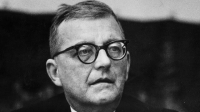
Dmitri Dmitriyevich Shostakovich, Russian composer. The USSR Supreme Soviet MP was awarded the Order of Lenin. The composer, who wrote the most important symphonies of the 20th century, produced many works, including soundtrack, song and jazz.
Eric Whitacre

Eric Edward Whitacre (born January 2, 1970) is an American composer, conductor, and speaker known for his choral, orchestral, and wind ensemble music. In March 2016, he was appointed as Los Angeles Master Chorale's first artist-in-residence at the Walt Disney Concert Hall.
Biagio Marini
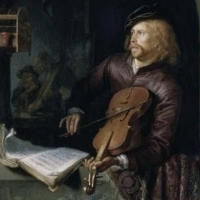
Biagio Marini (5 February 1594 – 20 March 1663) was an Italian virtuoso violinist and composer in the first half of the seventeenth century.Marini was born in Brescia. He may have studied with his uncle Giacinto Bondioli. His works were printed and influential throughout the European musical world. He traveled throughout his life, and occupied posts in Brussels, over thirty years in Neuburg an der Donau and Düsseldorf, and Venice in 1615, joining Monteverdi's group at St. Mark's Cathedral, Padua, Parma, Ferrara, Milan, Bergamo, and Brescia in Italy. There is evidence that he married three times and fathered five children. He died in Venice.
Guns N' Roses

Guns N 'Roses is an American rock band founded in 1985 in Los Angeles, California. Axl Rose, Slash, Izzy Stradlin, Duff McKagan, and Steven , Genres: Hard rock, Heavy metal, Blues rock, Glam rock They started their music life in Los Angeles, California, USA (1985) Albums: Appetite for Destruction, Use Your Illusion I
Herbie Hancock

Herbert Jeffrey "Herbie" Hancock (born April 12, 1940) is an American pianist and composer. He is regarded not only as one of the greatest living jazz musicians, but also as one of the most influential jazz musicians of the 20th century. His music embraces elements of funk and soul while adopting freer stylistic elements from jazz. In his jazz improvisation, he possesses a unique creative blend of jazz, blues, and modern classical music, with harmonic stylings much like the styles of Claude Debussy and Maurice Ravel.
As part of Miles Davis's "second great quintet," Hancock helped redefine the role of a jazz rhythm section, and was one of the primary architects of the "post-bop" sound. Later, he was one of the first jazz musicians to embrace synthesizers and funk. Hancock's music is often melodic and accessible; he has had many songs "cross over" and achieved success among pop audiences.
Herbie's best-known solo works include "Cantaloupe Island," "Watermelon Man" (later performed by dozens of musicians, including bandleader Mongo Santamaria), "Maiden Voyage," "Chameleon," and the singles " I Thought It Was You" and "Rockit." His 2007 tribute album "River: The Joni Letters" won the 2007 Grammy Award for Album of the Year, only the second jazz album ever to win the award after 1965's Getz/Gilberto.
He is an adherent of the Nichiren school of Mahayana Buddhism.
As part of Miles Davis's "second great quintet," Hancock helped redefine the role of a jazz rhythm section, and was one of the primary architects of the "post-bop" sound. Later, he was one of the first jazz musicians to embrace synthesizers and funk. Hancock's music is often melodic and accessible; he has had many songs "cross over" and achieved success among pop audiences.
Herbie's best-known solo works include "Cantaloupe Island," "Watermelon Man" (later performed by dozens of musicians, including bandleader Mongo Santamaria), "Maiden Voyage," "Chameleon," and the singles " I Thought It Was You" and "Rockit." His 2007 tribute album "River: The Joni Letters" won the 2007 Grammy Award for Album of the Year, only the second jazz album ever to win the award after 1965's Getz/Gilberto.
He is an adherent of the Nichiren school of Mahayana Buddhism.
Dire Straits
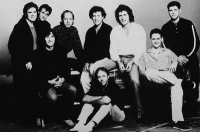
Dire Straits were an English rock band, formed in 1977 by Mark Knopfler (guitar and vocals), his brother David Knopfler (guitar), John Illsley (bass), and Pick Withers (drums), and subsequently managed by Ed Bicknell. Although the band was formed in an era when punk rock reigned, Dire Straits worked within the conventions of classic rock, albeit with a stripped-down sound that appealed to modern audiences weary of the overproduced stadium rock of the 1970s. In their early days, Mark and David requested that pub owners turn down the amps so that patrons could converse while the band played — indicative of their unassuming demeanor. Despite this oddly self-effacing approach to rock and roll, Dire Straits soon became hugely successful, with their first album going multi-platinum globally.
The band's best-known songs include "Sultans of Swing", "Romeo and Juliet", "Tunnel of Love", "Telegraph Road", "Private Investigations", "Money for Nothing", "Walk of Life", "So Far Away", "Brothers in Arms" and "Calling Elvis".
Dire Straits and Mark Knopfler have sold in excess of 118 million albums to date.
The band's best-known songs include "Sultans of Swing", "Romeo and Juliet", "Tunnel of Love", "Telegraph Road", "Private Investigations", "Money for Nothing", "Walk of Life", "So Far Away", "Brothers in Arms" and "Calling Elvis".
Dire Straits and Mark Knopfler have sold in excess of 118 million albums to date.
Sammy Nestico
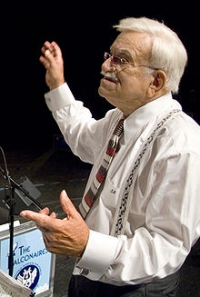
Samuel "Sammy" Louis Nestico (born February 6, 1924 in Pittsburgh, Pennsylvania) is a prolific and well known composer and arranger of big band music. Nestico is most known for his arrangements for the Count Basie orchestra.
Gustav Mahler

Gustav Mahler was an Austrian late-Romantic composer, and one of the leading conductors of his generation. As a composer he acted as a bridge between the 19th century Austro-German tradition and the modernism of the early 20th century.
Jed Whedon

Jed Tucker Whedon is an American screenwriter and musician, and the son of screenwriter Tom Whedon, grandson of screenwriter John Whedon, and the brother of screenwriter Zack Whedon and of producer/director/writer Joss Whedon.
Joe Henderson
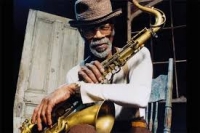
Born in Lima, Ohio, Henderson was one of five sisters and nine brothers. He was encouraged by his parents Dennis and Irene (née Farley) and older brother James T. to study music. He dedicated his first album to them "for being so understanding and tolerant" during his formative years. Early musical interests included drums, piano, saxophone and composition. According to Kenny Dorham, two local piano teachers who went to school with Henderson's brothers and sisters, Richard Patterson and Don Hurless, gave him a knowledge of the piano. He was particularly enamored of his brother's record collection. It seems that a hometown drummer, John Jarette, advised Henderson to listen to musicians like Lester Young, Stan Getz, Dexter Gordon and Charlie Parker. He also liked Flip Phillips, Lee Konitz and the Jazz at the Philharmonic recordings. However, Parker became his greatest inspiration. His first approach to the saxophone was under the tutelage of Herbert Murphy in high school. In this period of time, he wrote several scores for the school band
Jean Sibelius

Jean Sibelius ( pronunciation (help·info)) (8 December 1865 – 20 September 1957) was a Finnish composer of the later Romantic period whose music played an important role in the formation of the Finnish national identity. His mastery of the orchestra has been described as "prodigious."
The core of Sibelius's oeuvre is his set of seven symphonies. Like Beethoven, Sibelius used each successive work to further develop his own personal compositional style. His works continue to be performed frequently in the concert hall and are often recorded.
In addition to the symphonies, Sibelius's best-known compositions include Finlandia, the Karelia Suite, Valse triste, the Violin Concerto in D minor and The Swan of Tuonela (one of the four movements of the Lemminkäinen Suite). Other works include pieces inspired by the Finnish national epic, the Kalevala; over 100 songs for voice and piano; incidental music for 13 plays; the opera Jungfrun i tornet (The Maiden in the Tower); chamber music; piano music; Masonic ritual music; and 21 separate publications of choral music.
The core of Sibelius's oeuvre is his set of seven symphonies. Like Beethoven, Sibelius used each successive work to further develop his own personal compositional style. His works continue to be performed frequently in the concert hall and are often recorded.
In addition to the symphonies, Sibelius's best-known compositions include Finlandia, the Karelia Suite, Valse triste, the Violin Concerto in D minor and The Swan of Tuonela (one of the four movements of the Lemminkäinen Suite). Other works include pieces inspired by the Finnish national epic, the Kalevala; over 100 songs for voice and piano; incidental music for 13 plays; the opera Jungfrun i tornet (The Maiden in the Tower); chamber music; piano music; Masonic ritual music; and 21 separate publications of choral music.
Hair
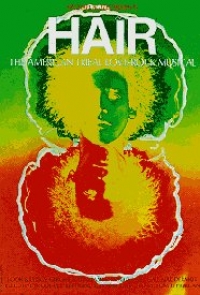
Hair: The American Tribal Love-Rock Musical is a rock musical with a book and lyrics by James Rado and Gerome Ragni and music by Galt MacDermot. A product of the hippie counter-culture and sexual revolution of the 1960s, several of its songs became anthems of the anti-Vietnam War peace movement. The musical's profanity, its depiction of the use of illegal drugs, its treatment of sexuality, its irreverence for the American flag, and its nude scene caused much comment and controversy. The musical broke new ground in musical theatre by defining the genre of the "rock musical", utilizing a racially-integrated cast and inviting the audience onstage for a "Be-in" finale.
Hair tells the story of the "tribe", a group of politically active, long-haired "Hippies of the Age of Aquarius" fighting against conscription to the Vietnam War and living a bohemian life together in New York City. They struggle to balance their young lives, loves and the sexual revolution with their pacifist rebellion against the war and the conservative impulses of their parents and society. Claude, one of the leaders of the tribe, must decide whether or not to resist the draft, as his friends have done.
After an off-Broadway debut in October 1967 at Joseph Papp's Public Theater and another run in a midtown discothèque space, the show opened on Broadway in April 1968 and ran for 1,750 performances, followed by a successful London production, which ran for 1,997 performances. Numerous productions have been staged around the world since then, and numerous recordings of the musical have been released. Several of the songs from its score became Top 40 hits, and a successful movie adaptation was released in 1979.
Hair tells the story of the "tribe", a group of politically active, long-haired "Hippies of the Age of Aquarius" fighting against conscription to the Vietnam War and living a bohemian life together in New York City. They struggle to balance their young lives, loves and the sexual revolution with their pacifist rebellion against the war and the conservative impulses of their parents and society. Claude, one of the leaders of the tribe, must decide whether or not to resist the draft, as his friends have done.
After an off-Broadway debut in October 1967 at Joseph Papp's Public Theater and another run in a midtown discothèque space, the show opened on Broadway in April 1968 and ran for 1,750 performances, followed by a successful London production, which ran for 1,997 performances. Numerous productions have been staged around the world since then, and numerous recordings of the musical have been released. Several of the songs from its score became Top 40 hits, and a successful movie adaptation was released in 1979.
The Cranberries
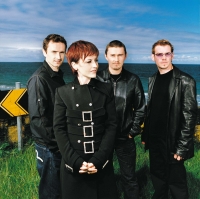
The Cranberries are an Irish rock band who formed in Limerick in 1989. The band consists of vocalist Dolores O'Riordan, guitarist Noel Hogan, bassist Mike Hogan and drummer Fergal Lawler. Although widely associated with alternative rock, the band's sound also incorporates indie pop, post-punk, Irish folk and pop rock elements.
The Cranberries rose to international fame in the 1990s with their debut album, Everybody Else Is Doing It, So Why Can't We?, which became a commercial success. The group was one of the most successful rock acts of the '90s and sold over 40 million albums worldwide. The band has achieved four top 20 albums on the Billboard 200 chart (Everybody Else Is Doing It, So Why Can't We?; No Need to Argue; To the Faithful Departed and Bury the Hatchet) and eight top 20 singles on the Modern Rock Tracks chart ("Linger", "Dreams", "Zombie", "Ode to My Family", "Ridiculous Thoughts", "Salvation", "Free to Decide" and "Promises").
In early 2010, after a six-year hiatus, The Cranberries reunited and began a North American tour, followed by shows in Latin America and Europe. The band recorded their sixth album Roses in May 2011, and released it on 27 February 2012.
The Cranberries rose to international fame in the 1990s with their debut album, Everybody Else Is Doing It, So Why Can't We?, which became a commercial success. The group was one of the most successful rock acts of the '90s and sold over 40 million albums worldwide. The band has achieved four top 20 albums on the Billboard 200 chart (Everybody Else Is Doing It, So Why Can't We?; No Need to Argue; To the Faithful Departed and Bury the Hatchet) and eight top 20 singles on the Modern Rock Tracks chart ("Linger", "Dreams", "Zombie", "Ode to My Family", "Ridiculous Thoughts", "Salvation", "Free to Decide" and "Promises").
In early 2010, after a six-year hiatus, The Cranberries reunited and began a North American tour, followed by shows in Latin America and Europe. The band recorded their sixth album Roses in May 2011, and released it on 27 February 2012.
Ray Brown
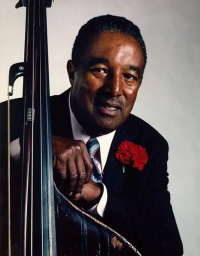
Raymond Matthews Brown was an American jazz double bassist known for extensive work with Oscar Peterson and Ella Fitzgerald.
Charles Mingus
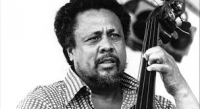
Charles Mingus Jr. (April 22, 1922 – January 5, 1979) was an American jazz double bassist, pianist, composer and bandleader. A major proponent of collective improvisation, he is considered to be one of the greatest jazz musicians and composers in history, with a career spanning three decades and collaborations with other jazz legends such as Louis Armstrong, Duke Ellington, Charlie Parker, Dizzy Gillespie, Dannie Richmond, and Herbie Hancock.
Mingus' compositions continue to be played by contemporary musicians ranging from the repertory bands Mingus Big Band, Mingus Dynasty, and Mingus Orchestra, to the high school students who play the charts and compete in the Charles Mingus High School Competition. In 1993, the Library of Congress acquired Mingus's collected papers—including scores, sound recordings, correspondence and photos—in what they described as "the most important acquisition of a manuscript collection relating to jazz in the Library's history"
Mingus' compositions continue to be played by contemporary musicians ranging from the repertory bands Mingus Big Band, Mingus Dynasty, and Mingus Orchestra, to the high school students who play the charts and compete in the Charles Mingus High School Competition. In 1993, the Library of Congress acquired Mingus's collected papers—including scores, sound recordings, correspondence and photos—in what they described as "the most important acquisition of a manuscript collection relating to jazz in the Library's history"
 Sheet Music Network is a site for those who wants to access popular sheet music easily,
letting them download the sheet music for free for trial purposes.
It's completely free to download and try the listed sheet music, but you have to delete the files after 24 hours of trial.
Don't forget, if you like the piece of music you have just learned playing,
treat the artist with respect, and go buy the original sheet music.
Sheet Music Network is a site for those who wants to access popular sheet music easily,
letting them download the sheet music for free for trial purposes.
It's completely free to download and try the listed sheet music, but you have to delete the files after 24 hours of trial.
Don't forget, if you like the piece of music you have just learned playing,
treat the artist with respect, and go buy the original sheet music.
